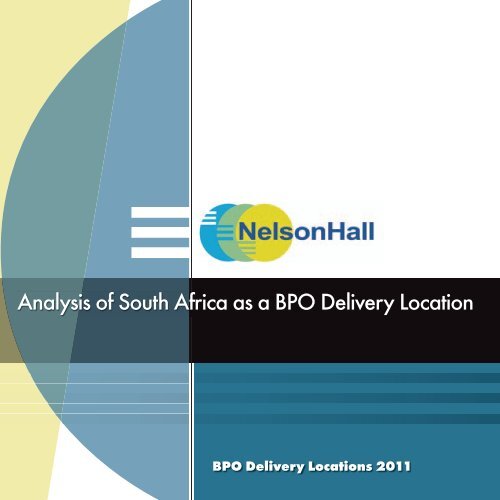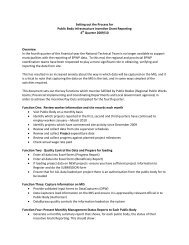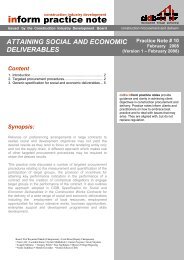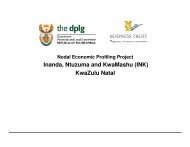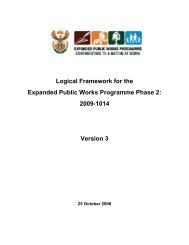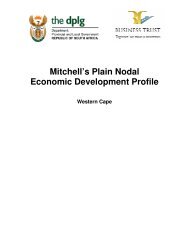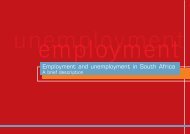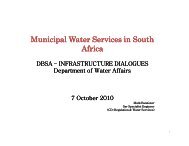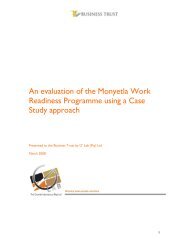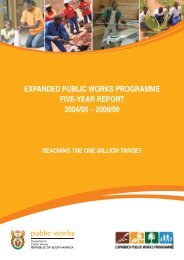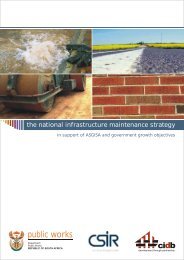Analysis of South Africa as a BPO Delivery Location - Business Trust
Analysis of South Africa as a BPO Delivery Location - Business Trust
Analysis of South Africa as a BPO Delivery Location - Business Trust
- No tags were found...
Create successful ePaper yourself
Turn your PDF publications into a flip-book with our unique Google optimized e-Paper software.
<strong>Analysis</strong> <strong>of</strong> <strong>South</strong> <strong>Africa</strong> <strong>as</strong> a <strong>BPO</strong> <strong>Delivery</strong> <strong>Location</strong><strong>BPO</strong> <strong>Delivery</strong> <strong>Location</strong>s 2011
PageTable <strong>of</strong> Contents3344Chapter 1: IntroductionA. Objectives and ScopeB. MethodologyC. Structure <strong>of</strong> the Report56810Chapter 2: Executive SummaryA. Potential <strong>as</strong> “Onshore-Equivalent” for Contact Centre ServicesB. GDN Centre within Financial Industry-Specific and Back-Office ServicesC. New Incentives Should Deliver 50% Cost Savings Relative to European Onshore Centres121215Chapter 3: International Contact Centre ServicesA. Drivers for Use <strong>of</strong> <strong>South</strong> <strong>Africa</strong> for Contact Centre ServicesB. Experience <strong>of</strong> Companies with Customer Service <strong>Delivery</strong> from <strong>South</strong> <strong>Africa</strong>171719Chapter 4: Financial Industry-Specific and Back-Office ServicesA. Drivers for Use <strong>of</strong> <strong>South</strong> <strong>Africa</strong> for Financial Industry-Specific and Back-Office ServicesB. Experience <strong>of</strong> Companies with Financial Industry-Specific and Back-Office Services from <strong>South</strong> <strong>Africa</strong>20Chapter 5: Skills Availability and Government Incentives242424263032363840424244464851515252Chapter 6: Companies Delivering Services from <strong>South</strong> <strong>Africa</strong>Contact Centre ServicesA. AegisB. CapQuest: Debt Collection ServicesC. FusionD. Merchants: ASDA and iiNet ISP Customer ServiceE. TeleperformanceF. UK-b<strong>as</strong>ed ISP/StreamG. UK Retail BankFinancial Industry-Specific and Back-Office ServicesH. CSCI. DiscoveryJ. Old MutualK. Shell Back-Office Services within Global <strong>Delivery</strong> NetworkDomestic Finance and Accounting ServicesL. GenpactOffshoring Support ServicesM. Full Circle1
Executive SummaryNelsonHall2Chapter2ChapterExecutive Summary<strong>South</strong> <strong>Africa</strong> h<strong>as</strong> not always been considered byorganisations which have polarised their service deliverybetween use <strong>of</strong> onshore centres for delivery <strong>of</strong> highcustomer experience and complex processes and low cost<strong>of</strong>fshore centres for simple transaction processing andcustomer service cost deflection.However, <strong>South</strong> <strong>Africa</strong> is worthy <strong>of</strong> considerationfor “<strong>BPO</strong>” delivery whether via a captive or <strong>of</strong>fshoringapproach, since it <strong>of</strong>fers an alternative to onshore servicesfor delivery <strong>of</strong> high levels <strong>of</strong> customer experience andhandling <strong>of</strong> relatively complex processes. In particular,organisations seeking new <strong>BPO</strong> delivery centres whetherfor captives or outsourced service delivery should evaluate<strong>South</strong> <strong>Africa</strong> <strong>as</strong>:• An “onshore-equivalent” for contact centre services• A GDN Centre for financial industry-specific and back<strong>of</strong>ficeservicesThe financial attractiveness <strong>of</strong> <strong>South</strong> <strong>Africa</strong> h<strong>as</strong> alsoimproved this year, with a new incentive scheme puttingthe cost <strong>of</strong> <strong>BPO</strong> service delivery at around 50-55% lowerthan equivalent European delivery and putting the cost<strong>of</strong> service within touching distance <strong>of</strong> that which can beachieved by use <strong>of</strong> <strong>of</strong>fshoring to the Philippines.NelsonHall 20115
APotential <strong>as</strong>“Onshore-Equivalent” forContact CentreServices6The pr<strong>of</strong>ile <strong>of</strong> customer service delivered from <strong>South</strong> <strong>Africa</strong> does not lend itself tolowest-cost <strong>of</strong>fshoring where metrics such <strong>as</strong> average handling time (AHT) ratherthan the quality <strong>of</strong> the customer experience are the main consideration for the clientorganisation.The type <strong>of</strong> international customer service being delivered from <strong>South</strong> <strong>Africa</strong> is bestsuited to organisations seeking high levels <strong>of</strong> customer experience through metricssuch <strong>as</strong> net promoter scores and high first contact resolution rates and those looking toresolve relatively complex customer queries.Amazon for example is ramping up its customer service from <strong>South</strong> <strong>Africa</strong> and isrecruiting “free-thinking” agents with the remit to focus on solving the customer’sproblem. The agents are not scripted, which is typical <strong>of</strong> <strong>South</strong> <strong>Africa</strong>n contact centreservices, and are authorised to take whatever action they feel is appropriate to achieveresolution and a high level <strong>of</strong> customer experience.Accordingly, it is most appropriate for organisations to establish customer servicedelivery from <strong>South</strong> <strong>Africa</strong> where they are seeking an onshore level <strong>of</strong> customerexperience, either at a significantly lower cost point than is available onshore or tocomplement existing onshore capability.The benefits currently achieved by organisations using contact centre services forinternational customer service, typically to the UK and Australia, were stated to be, inorder <strong>of</strong> number <strong>of</strong> mentions:• Equal or better customer experience relative to onshore delivery• Cultural alignment with the UK and Australia• Cost savings (typically in the range 30% to 50%) compared to onshore servicedelivery from the UK and Australia• Lower levels <strong>of</strong> attrition than onshore service delivery, with one organisation citinglike-for-like attrition approximately 60% <strong>of</strong> onshore levels for the same service• E<strong>as</strong>e <strong>of</strong> management relative to other <strong>of</strong>fshore locations. This manifests itself both interms <strong>of</strong> compatibility <strong>of</strong> time zones with the UK and Europe and e<strong>as</strong>e <strong>of</strong> travel fromthe UK by overnight flights• Availability <strong>of</strong> agents high relative to equivalent availability in the UK and Australia
Executive SummaryNelsonHall2ChapterIn terms <strong>of</strong> type <strong>of</strong> service delivered, the emph<strong>as</strong>is is typically on end-to-end customerservice across a range <strong>of</strong> customer query types. The pr<strong>of</strong>ile <strong>of</strong> services delivered from<strong>South</strong> <strong>Africa</strong> in support <strong>of</strong> international customer service is shown in Exhibit II-1.Exhibit II-1Services Delivered from <strong>South</strong> <strong>Africa</strong>n Contact Centres by SectorSectorPr<strong>of</strong>ile <strong>of</strong> Services SupportedTelecoms/ISPs/high-tech Inbound customer service including billing support (50%)Technical support (1st and 2nd level) (30%)Outbound sales and cross-selling (20%)Online retailing/home shoppingInbound customer service including delivery support and credit cardprocessing in support <strong>of</strong> online ordersInsurance Inbound customer service (70%)Customer retentions and renewals (20%)Cross-selling and up-selling (10%)Banking and other financial servicesDebt collection services (both pre-90 days and subsequent debt recovery)MediaCustomer support including payment queries and processing andsubscription handlingIn terms <strong>of</strong> volume, the dominant sectors at present are telecoms/ISPs and onlineretailing/home shopping, though <strong>South</strong> <strong>Africa</strong> h<strong>as</strong> relatively strong financial servicesdomain expertise and provides contact centre expertise in addition to industry-specificservices to international banks and insurance companies.In addition to English-language work, which currently accounts for approximately85% <strong>of</strong> international contact centre services from <strong>South</strong> <strong>Africa</strong>, <strong>South</strong> <strong>Africa</strong> alsoprovides European language customer service, with for example Lufthansa and Amazonboth providing German language customer service from <strong>South</strong> <strong>Africa</strong>.NelsonHall 20117
BGDN Centrewithin FinancialIndustry-Specificand Back-OfficeServicesWhile approximately 70% <strong>of</strong> current international <strong>BPO</strong> service delivery from <strong>South</strong> <strong>Africa</strong>comprises contact centre services, there is also a significant level <strong>of</strong> international service deliveryaround financial industry-specific and back-<strong>of</strong>fice services.The majority <strong>of</strong> these services are banking and insurance industry-specific services, though<strong>South</strong> <strong>Africa</strong> should also be considered <strong>as</strong> a potential location within an organisation’s globaldelivery network for back-<strong>of</strong>fice shared services in are<strong>as</strong> such <strong>as</strong> finance and accounting.Examples <strong>of</strong> services delivered from <strong>South</strong> <strong>Africa</strong> in support <strong>of</strong> financial industry-specificservices and back-<strong>of</strong>fice services are shown in Exhibit II-2.Exhibit II-2Industry-Specific and Back-Office Services Delivered from <strong>South</strong> <strong>Africa</strong>n by SectorSectorPr<strong>of</strong>ile <strong>of</strong> Services SupportedEnergyOrder taking and customer serviceCredit operationsCoordinating product scheduling and delivery with major clientsWealthLife insuranceInvestment new business supportCustomer data managementMoney collectionNew business capturePremium collectionPolicy administrationClaims processingCommissions handling8As with contact centre services, <strong>South</strong> <strong>Africa</strong> remains suited to the more complex handling <strong>of</strong>processes and customers within these domains, rather than the more b<strong>as</strong>ic transaction processing,which is incre<strong>as</strong>ingly being automated.For example, CSC uses <strong>South</strong> <strong>Africa</strong> <strong>as</strong> a staging post for the roll-out <strong>of</strong> life <strong>BPO</strong> services to its Indianoperations in support <strong>of</strong> its US life <strong>BPO</strong> clients and to handle complex parts <strong>of</strong> the value chain.Similarly both Old Mutual and Discovery are seeking to build global financial services sharedservice centres in <strong>South</strong> <strong>Africa</strong>, with both new financial services product development andprocessing being concentrated in <strong>South</strong> <strong>Africa</strong>.
Executive SummaryNelsonHall2ChapterOne significant difference between the international financial industry-specific and back-<strong>of</strong>fice servicesand the international contact centre services currently delivered from <strong>South</strong> <strong>Africa</strong> is the language mix.Within the international financial industry-specific and back-<strong>of</strong>fice services delivered currently there is amuch greater emph<strong>as</strong>is on support for non-English European languages, with for example Old Mutualsupporting its German business out <strong>of</strong> <strong>South</strong> <strong>Africa</strong> and Shell providing back-<strong>of</strong>fice shared services insupport <strong>of</strong> its Benelux, French, and Canadian businesses from <strong>South</strong> <strong>Africa</strong>.The re<strong>as</strong>on for this is that these organisations have found <strong>South</strong> <strong>Africa</strong> to be a more suitable source<strong>of</strong> Dutch and German language expertise combined with accounting and financial services skills thanEurope. Overall, the capability to support Continental European operations in languages such <strong>as</strong> Dutch,German and French out <strong>of</strong> <strong>South</strong> <strong>Africa</strong> is broadly comparable to, or better than, that out <strong>of</strong> moretraditional E<strong>as</strong>tern European locations such <strong>as</strong> Krakow, and potentially <strong>of</strong>fers higher value-for-money.The benefits achieved by organisations using <strong>South</strong> <strong>Africa</strong> for financial industry-specific and back<strong>of</strong>ficeservices, were stated to be, in order <strong>of</strong> number <strong>of</strong> mentions:• Presence <strong>of</strong> high-calibre financial services workforce for non-voice services, including a lower financialservices learning curve in <strong>South</strong> <strong>Africa</strong> than say India• Staff more productive than alternative <strong>of</strong>fshore locations for complex processing t<strong>as</strong>ks• Cost reduction <strong>of</strong> approximately 40% compared to Europe• Time zone benefits for complex t<strong>as</strong>ks where frequent communication with the client is required• Customers more amenable to service delivery from <strong>South</strong> <strong>Africa</strong> than from other <strong>of</strong>fshore locationssuch <strong>as</strong> India• Accent neutrality and cultural affinity• Access to a younger workforce with pride in serving international customersAs with contact centre services, it is apparent that <strong>South</strong> <strong>Africa</strong> is most appropriate for handling complexfinancial industry-specific and back-<strong>of</strong>fice t<strong>as</strong>ks, either <strong>as</strong> a global centre <strong>of</strong> excellence for banking orinsurance services, or <strong>as</strong> part <strong>of</strong> a global delivery network for back-<strong>of</strong>fice services such <strong>as</strong> finance andaccounting and fulfilment.NelsonHall 20119
CNew IncentivesShould Deliver50% CostSavings Relativeto EuropeanOnshoreCentres<strong>South</strong> <strong>Africa</strong>n service delivery h<strong>as</strong> traditionally suffered from pricecomparisons with India and the Philippines and <strong>South</strong> <strong>Africa</strong> remains aninappropriate location for large-scale processing <strong>of</strong> simple transactionsor customer queries, where the quality <strong>of</strong> customer experience is not amajor consideration.However, many organisations are incre<strong>as</strong>ingly automating simplecustomer service t<strong>as</strong>ks so that all remaining customer service queriesare either complex or highly emotional. Accordingly this is shiftingagent metrics from essentially cost me<strong>as</strong>ures such <strong>as</strong> average handlingtimes and minimisation <strong>of</strong> agent interaction to customer satisfactionme<strong>as</strong>ures such <strong>as</strong> first call resolution and net promoter scores.Customer service that is me<strong>as</strong>ured in this way is frequently regarded<strong>as</strong> needing to be delivered from onshore contact centres. However,<strong>South</strong> <strong>Africa</strong> and in particular Cape Town <strong>of</strong>fers an alternative,providing “onshore-equivalent” customer experience at a much lowerprice point, in the p<strong>as</strong>t typically 30% to 50% compared to say UKonshore delivery.That price point h<strong>as</strong> itself potentially left a gap compared to Englishlanguagecentres b<strong>as</strong>ed in the Philippines, where top-level customerexperience w<strong>as</strong> not paramount. However, <strong>South</strong> <strong>Africa</strong> h<strong>as</strong> introduced arevised incentive programme for the <strong>BPO</strong> sector effective from January1, 2011. The details <strong>of</strong> this incentive scheme are shown in Exhibit II-3.10
Executive SummaryNelsonHall2ChapterExhibit II-3Incentive Scheme: Offshore <strong>BPO</strong> in <strong>South</strong> <strong>Africa</strong>Number <strong>of</strong> Offshore Incentive 2011/12 2012/13 2013/14 2014/15 2015/16Jobs Created Each YearUp to 400 B<strong>as</strong>e Incentive R40,000 R40,000 R32,000 R32,000 R24,000401-800 20% one-<strong>of</strong>f bonus Bonus calculated for each job between 401 and 800801 Plus 30% one-<strong>of</strong>f bonus Bonus calculated for each job in excess <strong>of</strong> 800In order to be eligible for the above incentives, organisations need to register legal entities in<strong>South</strong> <strong>Africa</strong> that create at le<strong>as</strong>t 50 “<strong>of</strong>fshore” <strong>BPO</strong> jobs over a period <strong>of</strong> three years, and thatare delivering services to clients outside <strong>South</strong> <strong>Africa</strong>.The b<strong>as</strong>e incentive is paid for a period <strong>of</strong> three years on the b<strong>as</strong>is <strong>of</strong> the actual number <strong>of</strong>jobs created and sustained. The bonus incentive is paid once in the year in which the bonuslevel is first achieved.This new incentive scheme brings the average cost per agent per annum for contact centreservices to £11,100 (approximately $17,800) over each <strong>of</strong> the next three years. This shouldenable <strong>South</strong> <strong>Africa</strong> to incre<strong>as</strong>e cost savings compared to UK onshore delivery to 55% and put<strong>South</strong> <strong>Africa</strong> within a 5%-10% margin <strong>of</strong> prices charged out <strong>of</strong> the Philippines, making <strong>South</strong><strong>Africa</strong> worthy <strong>of</strong> consideration by organisations that are seeking high customer experience butremain price-sensitive relative to traditional <strong>of</strong>fshore alternatives.NelsonHall 201111
Chapter3International ContactCentre ServicesA12Driversfor Use <strong>of</strong><strong>South</strong> <strong>Africa</strong>for ContactCentreServices<strong>Business</strong> Challenges Faced and Drivers for Offshoring customer servicesExhibit III-1 shows, on the b<strong>as</strong>is <strong>of</strong> the organisations interviewed by NelsonHall, the currentpr<strong>of</strong>ile <strong>of</strong> sectors using <strong>South</strong> <strong>Africa</strong>n contact centre services for international customer service.Exhibit III-1Pr<strong>of</strong>ile <strong>of</strong> Sectors Using <strong>South</strong> <strong>Africa</strong>n Contact Centre ServicesSector Proportion (%)Insurance 25Telecoms/ISPs 25Banking and other financial services 19Online retailing/home shopping 13Media 6High-Tech 6Utilities 6Although telecoms providers are traditionally a key sector for contact centre services andthese are highly represented in the sample, given the high level <strong>of</strong> financial services expertiseresident in Cape Town and Johannesburg, it is not surprising that the financial services sectorshows up strongly even in the contact centre services market.
International Contact Centre ServicesNelsonHallAnother key sector incre<strong>as</strong>ingly using <strong>South</strong> <strong>Africa</strong>, and likely to grow significantly in terms <strong>of</strong> numbers <strong>of</strong> seatsover the next year <strong>as</strong> Amazon expands its operations in Cape Town, is the online retailing and home shopping sector.Overall organisations <strong>of</strong>fshoring contact centre services to <strong>South</strong> <strong>Africa</strong> are not doing so in order to achievemaximum customer service cost reduction. Instead, they are typically looking for an “onshore-equivalent” customerservice but lack the necessary capacity onshore and/or are endeavouring to achieve onshore-equivalence at a lowerprice point. Typically these organisations are “moving” service delivery from onshore but in some instances they arereacting against the standard <strong>of</strong> customer service from other <strong>of</strong>fshore locations.The principal business challenges faced by these organisations and their drivers for considering <strong>of</strong>fshoring to<strong>South</strong> <strong>Africa</strong> were in order <strong>of</strong> importance:• Need to scale to support business growth• Lack <strong>of</strong> onshore capacity/difficulty in recruiting onshore• Need to match onshore customer experience at lower price point• Brand protection at lower price point• Disillusion with customer service delivery from another <strong>of</strong>fshore location• Experiencing high attrition onshore3ChapterInternational Services Delivered and WhyExhibit III-2 shows the pr<strong>of</strong>ile <strong>of</strong> sectors using <strong>South</strong> <strong>Africa</strong> for international customer service by current number <strong>of</strong> seats.Exhibit III-2Pr<strong>of</strong>ile <strong>of</strong> Sectors Using <strong>South</strong> <strong>Africa</strong>n Contact Centre Services by Number <strong>of</strong> SeatsSector Proportion (%)Telecoms/ISPs 38Online retailing/home shopping 25Insurance 12Utilities 10Banking and other financial services 8High-Tech 4Media 3In terms <strong>of</strong> volume the dominant sectors at present are telecoms/ISPs and online retailing/home shopping.In addition to English-language work, which currently accounts for approximately 85% <strong>of</strong> international contactcentre services from <strong>South</strong> <strong>Africa</strong>, <strong>South</strong> <strong>Africa</strong> also provides European language customer service, with for exampleLufthansa and Amazon both providing German language customer service from <strong>South</strong> <strong>Africa</strong>.NelsonHall 201113
The pr<strong>of</strong>ile <strong>of</strong> services delivered from <strong>South</strong> <strong>Africa</strong> in support <strong>of</strong> international customerservice is shown in Exhibit III-3.Exhibit III-3Services Delivered from <strong>South</strong> <strong>Africa</strong>n Contact Centres by SectorSectorPr<strong>of</strong>ile <strong>of</strong> Services SupportedTelecoms/ISPs/high-tech Inbound customer service including billing support (50%)Technical support (1st and 2nd level) (30%)Outbound sales and cross-selling (20%)Online retailing/home shoppingInbound customer service including delivery support and credit cardprocessing in support <strong>of</strong> online ordersInsurance Inbound customer service (70%)Customer retentions and renewals (20%)Cross-selling and up-selling (10%)Banking and other financial servicesMediaDebt collection services (both pre-90 days and subsequent debt recovery)Customer support including payment queries and processing andsubscription handlingIn line with the “onshore-equivalence” <strong>of</strong> <strong>South</strong> <strong>Africa</strong>n contact centre services,the range <strong>of</strong> customer service delivered from <strong>South</strong> <strong>Africa</strong> typically goes beyond simplequeries to handling the full range <strong>of</strong> customer services, including complex queries.For example, CapQuest’s <strong>South</strong> <strong>Africa</strong>n captive h<strong>as</strong> 100 agents handling specialisttracing and debt collection covering UK customers. Similarly, iiNet handles the full range<strong>of</strong> its billing, provisioning, and technical support customer service from Cape Town, withthe dominant metric being net promoter score.14<strong>Location</strong> Selection Criteria and Re<strong>as</strong>ons for Choosing <strong>South</strong> <strong>Africa</strong> forInternational Contact Centre ServicesThe principal re<strong>as</strong>ons for choosing <strong>South</strong> <strong>Africa</strong> for international contact centre serviceswere identified to be (in order <strong>of</strong> number <strong>of</strong> mentions):• Time zone compatibility with UK and Europe• High level <strong>of</strong> cultural affinity between <strong>South</strong> <strong>Africa</strong> and UK and Europe and Australia• The attitude <strong>of</strong> agents towards contact centre work and a “natural” attitude towardscustomer service• The quality <strong>of</strong> agents in <strong>South</strong> <strong>Africa</strong>• The high acceptability <strong>of</strong> the <strong>South</strong> <strong>Africa</strong>n accent in the UK, Australia, and US
International Contact Centre ServicesNelsonHallThe three main locations for delivery <strong>of</strong> <strong>BPO</strong> services from <strong>South</strong> <strong>Africa</strong> are:• Cape Town• Johannesburg• DurbanCape Town is currently the key location for delivery <strong>of</strong> international contact centreservices, while Johannesburg is a centre <strong>of</strong> expertise for financial services capability,and Durban is incre<strong>as</strong>ingly being considered <strong>as</strong> a location for delivery <strong>of</strong> contact centreservices, especially in are<strong>as</strong> such <strong>as</strong> technical support.In addition, lower cost locations such <strong>as</strong> Port Elizabeth are incre<strong>as</strong>ingly beingconsidered for domestic customer service delivery but currently lack the maturity to beused for international customer service delivery3ChapterExperience <strong>of</strong>Companies withCustomer Service<strong>Delivery</strong> from<strong>South</strong> <strong>Africa</strong>BBenefits Sought and AchievedOrganisations using <strong>South</strong> <strong>Africa</strong> for contact centre services are typically not looking forthe lowest cost location globally. Typically they are seeking onshore levels <strong>of</strong> customerexperience at a reduced cost.The benefits achieved by organisations using contact centre services for internationalcustomer service, typically to the UK and Australia, were stated to be, in order <strong>of</strong> number<strong>of</strong> mentions:• Equal or better customer experience relative to onshore delivery• Cultural alignment with the UK and Australia• Cost savings (typically in the range 30% to 50%) compared to onshore service deliveryfrom the UK and Australia• Lower levels <strong>of</strong> attrition than onshore service delivery, with one organisation citing likefor-likeattrition approximately 60% <strong>of</strong> onshore levels for the same service• E<strong>as</strong>e <strong>of</strong> management relative to other <strong>of</strong>fshore locations• Availability <strong>of</strong> agents high relative to equivalent availability in the UK and AustraliaNelsonHall 201115
The emph<strong>as</strong>is on effectiveness rather than absolute cost reduction is indicated by the me<strong>as</strong>ures currently beingused to manage contact centre services in <strong>South</strong> <strong>Africa</strong>, with organisations typically placing low emph<strong>as</strong>is onaverage handling time (AHT) and frequently emph<strong>as</strong>ising performance against me<strong>as</strong>ures such <strong>as</strong>:• Net promoter scores (NPS)• First contact resolution rates (FCR)• Collection success• Up-sell percentagesIn line with this high emph<strong>as</strong>is on effectiveness, <strong>South</strong> <strong>Africa</strong>n agents are typically handling calls unscripted,with organisations aiming for high levels <strong>of</strong> natural communication in order to achieve high NPS scores.Examples <strong>of</strong> attrition in <strong>South</strong> <strong>Africa</strong> quoted were:• Financial services industry-specific processes (graduates): 4% to 13% per annum• Finance and accounting services (graduates): 15% per annum• Debt recovery services 19% per annum• Contact centre services (matric level): ranging from 15% to 40%, and averaging approximately25% per annum16Contact Centre Services <strong>Delivery</strong> Cost StructureThe cost <strong>of</strong> a contact centre agent in Cape Town is approximately ZAR 8K-9K per month with some companiespaying up to ZAR 12K for top-end agents.Telecoms costs are approximately 30% <strong>of</strong> the cost b<strong>as</strong>e for international service delivery to the UK and10% to Australia.This gives a total cost per FTE for contact centre services from Cape Town starting at approximately £14,500before government incentives. Taking into account the new incentive scheme, just announced, but not othertraining allowances brings the average cost per agent per annum to £11,100 (approximately $17,800) onaverage over each <strong>of</strong> the next three years.At the same time, it is expected that telecoms costs will reduce by approximately 15% per annum, giving afurther cost reduction per annum per FTE <strong>of</strong> approximately 4%.This should enable <strong>South</strong> <strong>Africa</strong> to incre<strong>as</strong>e cost savings compared to UK onshore delivery to approximately55% compared to a b<strong>as</strong>e cost <strong>of</strong> £25K in the UK and put <strong>South</strong> <strong>Africa</strong> within a 5%-10% margin <strong>of</strong> pricescharged out <strong>of</strong> the Philippines.Organisations serving the domestic <strong>South</strong> <strong>Africa</strong>n market are typically at the moment serving clients fromJohannesburg to a greater extent than from Cape Town and are typically investigating <strong>of</strong>fering services fromlocations such <strong>as</strong> Port Elizabeth, which is expected to have staff costs 30% lower than those in Cape Town.
Financial Industry-Specific and Back-Office ServicesChapter4NelsonHallFinancial Industry-Specific and Back-OfficeServicesThis chapter focuses on the delivery <strong>of</strong> financial services industry-specificprocesses such <strong>as</strong> new business capture, policy administration, andclaims processing together with back-<strong>of</strong>fice services such <strong>as</strong> finance andaccounting on behalf <strong>of</strong> multinationals.In both c<strong>as</strong>es, only service delivery in support <strong>of</strong> internationalcustomers is included.A4ChapterDrivers for Use<strong>of</strong> <strong>South</strong> <strong>Africa</strong>for FinancialIndustry-Specific andBack-OfficeServices<strong>Business</strong> Challenges Faced and Re<strong>as</strong>ons for Choosing <strong>South</strong> <strong>Africa</strong>The principal business challenges faced by organisations using <strong>South</strong> <strong>Africa</strong>n servicedelivery for financial industry-specific and back-<strong>of</strong>fice services from <strong>South</strong> <strong>Africa</strong> wereneed for access to domain expertise and access to domain expertise combined withEuropean language capability.Accordingly, the re<strong>as</strong>ons for organisations using <strong>South</strong> <strong>Africa</strong>n service delivery forindustry-specific and back-<strong>of</strong>fice services were in order <strong>of</strong> importance:• Leveraging the financial services skills within <strong>South</strong> <strong>Africa</strong> and availability <strong>of</strong> personnelwith appropriate skills• Sourcing European language skills within the organisation’s global delivery network• Quality <strong>of</strong> service delivery• Value for moneyNelsonHall 201117
The first <strong>of</strong> these points is the more obvious given the maturity <strong>of</strong> the banking and insurance sectors in<strong>South</strong> <strong>Africa</strong>. However, even in financial services, <strong>South</strong> <strong>Africa</strong> is typically being used for more complexprocessing t<strong>as</strong>ks, requiring high levels <strong>of</strong> expertise and frequently high levels <strong>of</strong> management interaction.For example, CSC uses <strong>South</strong> <strong>Africa</strong> <strong>as</strong> a staging post for the roll-out <strong>of</strong> life <strong>BPO</strong> services to its Indianoperations in support <strong>of</strong> its US life <strong>BPO</strong> clients and to handle complex parts <strong>of</strong> the value chain.Similarly both Old Mutual and Discovery are seeking to build global financial services shared servicecentres in <strong>South</strong> <strong>Africa</strong>, with both new financial services product development and processing beingconcentrated in <strong>South</strong> <strong>Africa</strong>.Perhaps more surprising is the role <strong>of</strong> <strong>South</strong> <strong>Africa</strong> in supporting Continental Europe, with forexample Old Mutual supporting its German business out <strong>of</strong> <strong>South</strong> <strong>Africa</strong> and Shell providing back-<strong>of</strong>ficeshared services in support <strong>of</strong> its Benelux, French, and Canadian businesses from <strong>South</strong> <strong>Africa</strong>.In both c<strong>as</strong>es, the companies found <strong>South</strong> <strong>Africa</strong> to be a more suitable source <strong>of</strong> Dutch and Germanlanguage expertise combined with accounting and financial services skills than Europe. Overall, thecapability to support Continental European operations in languages such <strong>as</strong> Dutch, German andFrench out <strong>of</strong> Cape Town is broadly comparable to, or better than, that out <strong>of</strong> more traditional E<strong>as</strong>ternEuropean locations such <strong>as</strong> Krakow, and potentially <strong>of</strong>fers higher value-for-money.Overall NelsonHall estimates that at present approximately 50% <strong>of</strong> financial industry-specific andback-<strong>of</strong>fices services delivered from <strong>South</strong> <strong>Africa</strong> are English language b<strong>as</strong>ed with the remaining 50%being German, Dutch, and French-b<strong>as</strong>ed. While it is likely that the proportion <strong>of</strong> English-language withinthis mix will incre<strong>as</strong>e <strong>as</strong> the industry scales, <strong>South</strong> <strong>Africa</strong> remains a viable consideration for ContinentalEuropean back-<strong>of</strong>fice services within a company’s global delivery network.18International Services Delivered and WhyExamples <strong>of</strong> services delivered from <strong>South</strong> <strong>Africa</strong> in support <strong>of</strong> financial industry-specific services andback-<strong>of</strong>fice services are shown in Exhibit IV-1.Exhibit IV-1Industry-Specific and Back-Office Services Delivered from <strong>South</strong> <strong>Africa</strong>n by SectorSectorEnergyWealthLife insurancePr<strong>of</strong>ile <strong>of</strong> Services SupportedOrder taking and customer serviceCredit operationsCoordinating product scheduling and delivery with major clientsInvestment new business supportCustomer data managementMoney collectionNew business capturePremium collectionPolicy administrationClaims processingCommissions handlingIn general, <strong>South</strong><strong>Africa</strong> remainssuited to the morecomplex handling<strong>of</strong> processes andcustomers withinthese domains,rather than the moreb<strong>as</strong>ic transactionprocessing, which isincre<strong>as</strong>ingly beingautomated.
Financial Industry-Specific and Back-Office ServicesNelsonHall4ChapterExperience<strong>of</strong> Companieswith FinancialIndustry-Specificand Back-OfficeServices from<strong>South</strong> <strong>Africa</strong>BBenefits Sought and AchievedThe benefits achieved by organisations using <strong>South</strong> <strong>Africa</strong> for financial industryspecificand back-<strong>of</strong>fice services, were stated to be, in order <strong>of</strong> number <strong>of</strong>mentions:• Presence <strong>of</strong> high-calibre financial services workforce for non-voice services,including a lower financial services learning curve in <strong>South</strong> <strong>Africa</strong> than say India• Staff more productive than alternative <strong>of</strong>fshore locations for complexprocessing t<strong>as</strong>ks• Cost reduction <strong>of</strong> approximately 40% compared to Europe• Time zone benefits for complex t<strong>as</strong>ks where frequent communication with theclient is required• Customers more amenable to service delivery from <strong>South</strong> <strong>Africa</strong> than fromother <strong>of</strong>fshore locations such <strong>as</strong> India• Accent neutrality and cultural affinity• Access to a younger workforce with pride in serving international customersAs with contact centre services, it is apparent that <strong>South</strong> <strong>Africa</strong> is most appropriatefor handling complex financial industry-specific and back-<strong>of</strong>fice t<strong>as</strong>ks, either <strong>as</strong> aglobal centre <strong>of</strong> excellence for banking or insurance services, or <strong>as</strong> part <strong>of</strong> a globaldelivery network for back-<strong>of</strong>fice services such <strong>as</strong> finance and accounting andfulfilment.NelsonHall 201119
Chapter5Skills Availability andGovernment IncentivesSkills and Infr<strong>as</strong>tructure Availability<strong>South</strong> <strong>Africa</strong> h<strong>as</strong> approximately 3.6m English speakers with 87,000 graduates per annumemerging from its universities.However, the contact centre industry in <strong>South</strong> <strong>Africa</strong> typically employs first-time agentsfrom the matriculating (high school) population rather than from the graduate population,with organisations stating that approximately 1 in 4 applicants are <strong>of</strong> a suitable standardto become customer service agents. The matriculating and non-degree tertiary pool <strong>of</strong>personnel consists <strong>of</strong> 258,000 personnel per annum.While some organisations use language and accent training for example to utiliseAfrikaans-speakers in Dutch, the majority <strong>of</strong> organisations operating contact centres in<strong>South</strong> <strong>Africa</strong> do not carry out accent training.<strong>South</strong> <strong>Africa</strong> also h<strong>as</strong> an established body <strong>of</strong> personnel with accounting and financialservices expertise, including approximately 26,000 chartered accountants, 800 CFA charterholders, and 770 qualified actuaries.In terms <strong>of</strong> physical infr<strong>as</strong>tructure, the standard <strong>of</strong> buildings and roads in cities such <strong>as</strong>Cape Town are comparable with those in Western Europe.One <strong>of</strong> the attractions <strong>of</strong> <strong>South</strong> <strong>Africa</strong>, and in particular Cape Town, is that it is a locationwhere executives from the UK, Europe, and Australia will feel relatively at home culturally,and where they will be willing to visit, even for extended periods. Short visits are facilitatedfrom the UK by the availability <strong>of</strong> overnight flights in both directions, so that working timelost due to travel is minimised.The telecoms infr<strong>as</strong>tructure now appears to be robust, with low levels <strong>of</strong> incidentsreported. However, although the cost <strong>of</strong> telecoms h<strong>as</strong> fallen considerably in recent years, itremains high relative to other potential <strong>of</strong>fshore locations.20
Skills Availability and Government IncentivesNelsonHall5ChapterGovernment Support and Incentives for <strong>BPO</strong>The <strong>BPO</strong> industry in <strong>South</strong> <strong>Africa</strong> is supported by the Department <strong>of</strong> Trade and Industry, the<strong>Business</strong> <strong>Trust</strong>, and BPeSA (<strong>Business</strong> Process enabling <strong>South</strong> <strong>Africa</strong>), which is the national cocoordinatingbody representing the interests <strong>of</strong> the business process outsourcing and <strong>of</strong>fshoringsector in <strong>South</strong> <strong>Africa</strong>. The partnership <strong>of</strong> these three bodies is aiming to create 40,000 <strong>of</strong>fshore<strong>BPO</strong> jobs by 2015.The role <strong>of</strong> the <strong>BPO</strong> sector development programme includes:• Providing support to investors to set-up in <strong>South</strong> <strong>Africa</strong>• The implementation and administration <strong>of</strong> the incentive programme.• Driving the quality <strong>as</strong>surance programme• Supporting the planning <strong>of</strong> talent development programmes• Managing the implementation <strong>of</strong> the Monyetla Work Readiness Programme TM , which provideswork readiness training to unemployed youthA revised incentive programme for the <strong>BPO</strong> sector w<strong>as</strong> effective from January 1, 2011. The details<strong>of</strong> this incentive scheme are shown in Exhibit V-1.Exhibit V-1Incentive Scheme: Offshore <strong>BPO</strong> in <strong>South</strong> <strong>Africa</strong>Number <strong>of</strong> Offshore Jobs Incentive 2011/12 2012/13 2013/14 2014/15 2015/16Created Each YearUp to 400B<strong>as</strong>e R40,000 R40,000 R32,000 R32,000 R24,000Incentive401-800 20% one-<strong>of</strong>f Bonus calculated for each job between 401 and 800bonus801 Plus 30% one-<strong>of</strong>fbonusBonus calculated for each job in excess <strong>of</strong> 800NelsonHall 201121
22In order to be eligible for the incentives, organisations need to registerlegal entities in <strong>South</strong> <strong>Africa</strong> that create at le<strong>as</strong>t 50 “<strong>of</strong>fshore” <strong>BPO</strong>jobs over a period <strong>of</strong> three years, and that are delivering services toclients outside <strong>South</strong> <strong>Africa</strong>.The b<strong>as</strong>e incentive is paid for a period <strong>of</strong> three years on the b<strong>as</strong>is<strong>of</strong> the actual number <strong>of</strong> jobs created and sustained. The bonusincentive is paid once in the year in which the bonus level is firstachieved.In addition, the <strong>South</strong> <strong>Africa</strong>n government provides financialsupport for talent development programmes, through:• The Monyetla Work Readiness Programme TM , whereby employerslead consortia to recruit and train entry level staff, and thegovernment provides ZAR 18,150 per unemployed person trained• Sector Education and Training Programmes, covering key sectorssuch <strong>as</strong> banking, insurance, services, finance and accounting, andIT, whereby employers can claim up to 75% <strong>of</strong> levies paid underthe National Skills FundThe Monyetla Work Readiness Programme TM aims to incre<strong>as</strong>e the pool<strong>of</strong> entry-level employable people while SETA aims to accelerate thedevelopment <strong>of</strong> home-grown supervisors and managers. Recently,86% <strong>of</strong> learners trained have been found competent, with 90% <strong>of</strong>these subsequently employed by <strong>BPO</strong> companies. Three thousandfour hundred learners will be put through this programme in2010/11.Examples <strong>of</strong> the relevant SETA programmes are listed inExhibit V-2.
Skills Availability and Government IncentivesNelsonHall5ChapterExhibit V-2Sector Education and Training Agency ProgrammesSectorExamples <strong>of</strong> CoursesServicesContact centre managementContact centre operationsContact centre supportBankingFinancial services advice (for learners with grade 12 certificate)Certificate in business management (for learners with 3-yeartertiary qualification)InsuranceAdvanced programme in risk managementInvestment advice certificateAdvanced diploma in insurance managementFinance and accounting Certified accounting technicianGeneral internal auditingPr<strong>of</strong>essional accountant in practiceITSystems developmentSystems supportDiploma in technology management and innovationIn general, organisations, particularly service providers, using <strong>South</strong> <strong>Africa</strong>ndelivery should look to get involved in talent development initiatives such <strong>as</strong> theseboth from a corporate responsibility perspective and also for access to trainedpersonnel.Services are also available to <strong>as</strong>sist organisations in testing the viability <strong>of</strong>captive delivery (and outsourced) international service delivery from <strong>South</strong> <strong>Africa</strong>and in gaining access to local knowledge, with, for example, both Capquest andAmazon initially clients <strong>of</strong> Full Circle’s Model Office service.NelsonHall 201123
Chapter6Companies DeliveringServices from <strong>South</strong> <strong>Africa</strong>AContact Centre ServicesAegisAegis is owned by the Essar Group, and h<strong>as</strong> approximately 50,000 contact centre agents globallyacross 50 global locations.Aegis entered the <strong>South</strong> <strong>Africa</strong>n contact centre services market with the acquisition <strong>of</strong> CCN Groupin 2008 and aims to use <strong>South</strong> <strong>Africa</strong> both to serve the UK market and <strong>as</strong> a stepping stone into <strong>Africa</strong>ndomestic markets. At the time <strong>of</strong> the acquisition, CCN had two international clients and 12 domesticclients in <strong>South</strong> <strong>Africa</strong>.Aegis currently h<strong>as</strong> two contact centres in <strong>South</strong> <strong>Africa</strong> and employs approximately 2,000 personnelin <strong>South</strong> <strong>Africa</strong>. The company’s <strong>South</strong> <strong>Africa</strong>n revenues are approximately equally split between itsinternational and domestic revenues.The company views <strong>South</strong> <strong>Africa</strong> <strong>as</strong> a strategic location and is investing a further ZAR 500m inits <strong>South</strong> <strong>Africa</strong>n business with the aim <strong>of</strong> growing its <strong>South</strong> <strong>Africa</strong>n operations to 5,000 FTEs overthree years. These investments will include acquisition <strong>of</strong> a first-stage collections capability and furtherinvestment in the company’s Aegis Academy for development <strong>of</strong> personnel.Approximately 90% <strong>of</strong> the contact centre services supplied by Aegis to UK companies is deliveredfrom <strong>South</strong> <strong>Africa</strong>. Aegis is currently serving three UK companies with contact centre services from<strong>South</strong> <strong>Africa</strong>. These are:• A UK utility• A UK telco/ISP• A household services company24
Companies Delivering Services from <strong>South</strong> <strong>Africa</strong>NelsonHall6The UK utility initially sent out a RFP to suppliers in both the Philippines and <strong>South</strong> <strong>Africa</strong> and conducted both country and supplierdue diligence simultaneously.The principal re<strong>as</strong>ons why the UK utility decided to adopt services from <strong>South</strong> <strong>Africa</strong> rather than the Philippines were:• The acceptability <strong>of</strong> the <strong>South</strong> <strong>Africa</strong>n voice accent to UK customers• The availability <strong>of</strong> agents with acceptable accents, and the fact that no accent neutralisation training w<strong>as</strong> required for <strong>South</strong><strong>Africa</strong>n agents• The ability <strong>of</strong> <strong>South</strong> <strong>Africa</strong>n agents to handle “<strong>of</strong>f-script” communicationChapterThe <strong>South</strong> <strong>Africa</strong>n service delivery started from Johannesburg in October 2008 and w<strong>as</strong> built up in the following steps:• Initially a 6 month pilot involving 50 agents and handling two relatively simple call types• At the end <strong>of</strong> this initial 6 month period, the “pilot” w<strong>as</strong> scaled to 150 agents handling the same two call types for a furthersix-month period• During the third 6 month period, the capabilities <strong>of</strong> the 150 agents were enhanced to cover all seven call types handled by theUK utility• After 21 months, the operation w<strong>as</strong> scaled to 350 customer service agents covering all seven call typesThe service is provided on a 24 x 7 b<strong>as</strong>is, with the UK utility scaling down its onshore centres during anti-social hours.The main metric used by the UK utility is net promoter score (NPS) and the NPS scores achieved by the <strong>South</strong> <strong>Africa</strong>n agents arewithin plus or minus 5% <strong>of</strong> those achieved in the UK. However, NPS scores do tend to be slightly lower during anti-social hoursreflecting overall satisfaction with the utility’s service.The cost reduction achieved compared to the utility’s UK onshore contact centre is approximately 40%.The training in support <strong>of</strong> the service transition for the utility w<strong>as</strong> <strong>as</strong> follows:• For skills transfer for the initial two call types, dedicated <strong>South</strong> <strong>Africa</strong>n trainers were trained in the UK at the client contact centre• For up-skilling agents from two call types to seven call types, training support from the UK w<strong>as</strong> also sent onsite to <strong>South</strong> <strong>Africa</strong>for a 3 month periodIt is anticipated that the utility will substantially incre<strong>as</strong>e its use <strong>of</strong> customer service delivery from <strong>South</strong> <strong>Africa</strong> during the comingyear, with additional cities being considered in addition to Johannesburg.The UK telco/ISP began delivering customer service from <strong>South</strong> <strong>Africa</strong> in 2006. The company uses India for non-voice back<strong>of</strong>ficeprocessing and uses <strong>South</strong> <strong>Africa</strong> for load balancing its customer service with its UK contact centres. Customer service isnow delivered from <strong>South</strong> <strong>Africa</strong> on a 24 x 7 x 365 b<strong>as</strong>is.The company began use <strong>of</strong> <strong>South</strong> <strong>Africa</strong>n delivery from Johannesburg with a 50 person pilot for 6 months covering justpre-paid support. The <strong>South</strong> <strong>Africa</strong>n service delivery w<strong>as</strong> then expanded to 300 agents covering both pre-paid and post-paidcustomers over an 18 month period.The major re<strong>as</strong>on for choosing <strong>South</strong> <strong>Africa</strong> w<strong>as</strong> the quality <strong>of</strong> English voice, with net promoter score (NPS) being the majormetric used. Scores from <strong>South</strong> <strong>Africa</strong>n delivery for this organisation are within plus or minus 3% <strong>of</strong> those achieved onshore inthe UK.In addition, the company achieves approximately 40% cost savings in <strong>South</strong> <strong>Africa</strong> relative to UK onshore customer service delivery.NelsonHall 201125
BCapQuest:DebtCollectionServicesThis c<strong>as</strong>e study illustrates the use <strong>of</strong> <strong>South</strong> <strong>Africa</strong>n <strong>BPO</strong> delivery in support<strong>of</strong> collection <strong>of</strong> overdue debt from UK consumers by CapQuest, a leadingUK manager <strong>of</strong> overdue debts.The c<strong>as</strong>e study illustrates:• The re<strong>as</strong>ons why CapQuest selected <strong>South</strong> <strong>Africa</strong> for delivery <strong>of</strong> debtcollection services into the UK• The pr<strong>of</strong>ile <strong>of</strong> services delivered from <strong>South</strong> <strong>Africa</strong>• The benefits sought and achieved from <strong>South</strong> <strong>Africa</strong>n <strong>BPO</strong> delivery• The lessons applicable to organizations evaluating use <strong>of</strong> international<strong>BPO</strong> services from <strong>South</strong> <strong>Africa</strong>BackgroundCapQuest w<strong>as</strong> founded in 1985 and is one <strong>of</strong> the UK’s most experiencedmanagers <strong>of</strong> overdue debts. The company acquires debts from variouslenders including banks, credit card companies, stores, catalogue retailersand many other providers <strong>of</strong> credit to individuals. CapQuest also workswith and acts on behalf <strong>of</strong> many leading high street lenders, contactingtheir customers to help settle outstanding debts.26
Companies Delivering Services from <strong>South</strong> <strong>Africa</strong>Drivers for Use <strong>of</strong> <strong>South</strong> <strong>Africa</strong>One <strong>of</strong> CapQuest’s main streams <strong>of</strong> business centres on the acquisition <strong>of</strong>“gone-away” debt, where the debtor h<strong>as</strong> to be traced in order for collectionto proceed and in 2005 CapQuest w<strong>as</strong> seeking additional resource to scale theservicing <strong>of</strong> its “trace and collect” accounts in a cost-effective manner.Accordingly the company started to investigate the possibilities for <strong>of</strong>fshoringsome <strong>of</strong> its tracing activity. India w<strong>as</strong> ruled out <strong>as</strong> a location since the companyperceived that levels <strong>of</strong> attrition in India were unacceptably high and that thecompany’s UK clients had a low acceptance <strong>of</strong> use <strong>of</strong> Indian contact centres.CapQuest evaluated various international locations but chose <strong>South</strong> <strong>Africa</strong>for the following re<strong>as</strong>ons:• The company had a number <strong>of</strong> <strong>South</strong> <strong>Africa</strong>ns within its UK operations andthese agents were highly effective at debt collection• Culturally and legally the UK and <strong>South</strong> <strong>Africa</strong> are very similar, which wouldfacilitate transition and operations within a highly-regulated industry• Time zone compatibility, with time zone differences relative to the UK <strong>of</strong>1-2 hours• Access to an educated workforce who had English <strong>as</strong> their first languageNelsonHall6ChapterServices Delivered from <strong>South</strong> <strong>Africa</strong>CapQuest executives visited <strong>South</strong> <strong>Africa</strong> in late 2005, and developed a pro<strong>of</strong><strong>of</strong>-conceptin <strong>South</strong> <strong>Africa</strong> in June to July 2006. The pro<strong>of</strong>-<strong>of</strong>-concept w<strong>as</strong>successful and the company began interviewing team leaders in December2006 with the <strong>South</strong> <strong>Africa</strong>n centre commencing <strong>as</strong> a pilot operation with25 personnel in March 2007.At that time, the focus <strong>of</strong> the work being carried out from <strong>South</strong> <strong>Africa</strong> w<strong>as</strong>solely datab<strong>as</strong>e tracing with no verbal contact taking place between the <strong>South</strong><strong>Africa</strong>n agents and the UK debtors.However, the scope <strong>of</strong> the work carried out from <strong>South</strong> <strong>Africa</strong> w<strong>as</strong> rapidlyexpanded to cover the full “trace and collect” service, with the number <strong>of</strong> callcentre agents in <strong>South</strong> <strong>Africa</strong> trained in specialist tracing and debt collectiontechniques expanding to 100 over the next 18 months.In addition to supporting its UK operations from <strong>South</strong> <strong>Africa</strong>, CapQuestis also now providing debt collection services to <strong>South</strong> <strong>Africa</strong>n companies’domestically.NelsonHall 201127
Benefits Sought and AchievedA comparison <strong>of</strong> UK collections performance against like-for-like control groups in<strong>South</strong> <strong>Africa</strong> and the UK is shown in Exhibit VI-1.Exhibit VI-1Comparison <strong>of</strong> UK and <strong>South</strong> <strong>Africa</strong> Collections PerformanceMetric<strong>South</strong> <strong>Africa</strong>’s performance compared to the UKAverage 1st payment value 8% betterLiquidation <strong>of</strong> balance (%) EqualConversion rate upon CWD (%) 1% betterAccordingly, CapQuest h<strong>as</strong> met its initial goal <strong>of</strong> finding a source <strong>of</strong> collectionscapability to service UK debtors and at an acceptable rate <strong>of</strong> attrition. CapQuest’s12-month rolling turnover <strong>of</strong> agents in <strong>South</strong> <strong>Africa</strong> stood at 18.9% for 2010, with12-month rolling sickness levels for 2010 <strong>of</strong> 1.48%.It should be born in mind that the CapQuest call centre operates a shift patternlate into the evening and inclusive <strong>of</strong> weekend working.In terms <strong>of</strong> costs, the cost <strong>of</strong> an agent in <strong>South</strong> <strong>Africa</strong> in support <strong>of</strong> these services isapproximately 40% <strong>of</strong> the comparable cost in the UK.While telecoms costs are more expensive in <strong>South</strong> <strong>Africa</strong>, the cost <strong>of</strong> <strong>of</strong>fices isin the range ZAR 70 to ZAR 130 per square meter, giving savings in excess <strong>of</strong> 90%compared to say <strong>of</strong>fices in the south <strong>of</strong> England at around £20 per square foot.CapQuest now perceives that <strong>South</strong> <strong>Africa</strong> <strong>of</strong>fers:• “Talented and growing workforce with widespread use <strong>of</strong> English and culturalaffinity to the UK• Excellent aptitude and attitude for collections-environment calling• Willingness to learn permits staff to develop and boost specialist skills• Time zone alignment allows staff to work day and early evening shifts• Developing telecommunications infr<strong>as</strong>tructure• Economic, education and legal system compatible with UK”28
Companies Delivering Services from <strong>South</strong> <strong>Africa</strong>NelsonHall6ChapterLessons LearnedCapQuest h<strong>as</strong> proved that it is possible to find personnelwith an aptitude for tracing and collection in support <strong>of</strong>the UK market within <strong>South</strong> <strong>Africa</strong>. Two critical successfactors identified by CapQuest in order to achievesuccessful operations in <strong>South</strong> <strong>Africa</strong> are:• It is necessary to invest significantly in bothmanagement and product and service training.CapQuest sent two managers from the UK to <strong>South</strong><strong>Africa</strong> on long-term contracts for long term managerialand operational continuity. In addition, CapQuestsent two senior collections agents and/or a variety<strong>of</strong> training staff every quarter for approx 12 monthsto help support and develop the agents in theirroles, establishing the necessary product knowledgeand providing training in specialist tracing and debtcollection techniques.• It is important to get agent remuneration levels right.CapQuest pays health insurance for its agents togetherwith performance-related bonuses. However, it isimportant to neither underpay, which potentially leadsto high attrition, or overpay, which potentially leads toretention <strong>of</strong> inappropriate agents.NelsonHall 201129
FusionCBackgroundThe Budget Group <strong>of</strong> companies established a pilot operation <strong>of</strong> 40 customer service personnel in<strong>South</strong> <strong>Africa</strong> in 2003.By 2008, the number <strong>of</strong> personnel in the <strong>South</strong> <strong>Africa</strong>n operations had grown to 350, and thedecision w<strong>as</strong> taken to commercialise the <strong>South</strong> <strong>Africa</strong>n operations, forming Fusion SA.Today, Fusion employs approximately 1,700 personnel in locations in Cape Town and Johannesburg.Services Delivered from <strong>South</strong> <strong>Africa</strong>Fusion now h<strong>as</strong> 16 clients that are serviced from <strong>South</strong> <strong>Africa</strong>, with approximately 30% <strong>of</strong> theservices being delivered to the UK consumer market and 70% to the domestic <strong>South</strong> <strong>Africa</strong>nmarket.Clients are predominantly in the telecommunication and financial services sectors, with insurancecustomer service continuing to be highly important for the international UK market. Other sectorsserved include FCMG, leisure and media amongst others.In particular, Fusion h<strong>as</strong> five UK clients: four insurance companies and one media company. Thepr<strong>of</strong>ile <strong>of</strong> services delivered is approximately:• Customer service (65%)• Customer retention and renewals (20%)• Sales completion, including cross-selling, up-selling and add-on sales (15%)For the media company, Fusion carries out the following services across voice, email and faxchannels:• PCI tier one environment• Payment queries and processing• Subscription handling• Some fulfilment30Fusion’s delivery is split between Cape Town (70%) and Johannesburg (30%) with all internationalservice delivery for UK clients delivered from Cape Town.
Companies Delivering Services from <strong>South</strong> <strong>Africa</strong>NelsonHall6ChapterDrivers for Use <strong>of</strong> <strong>South</strong> <strong>Africa</strong>Budget initially evaluated both India and the Philippines in addition to <strong>South</strong><strong>Africa</strong>. <strong>South</strong> <strong>Africa</strong> w<strong>as</strong> largely chosen on the b<strong>as</strong>is <strong>of</strong> three factors:• English (UK) neutral accent• Availability <strong>of</strong> agents for rapid growth• Very high level <strong>of</strong> cultural compatibility, with for example <strong>South</strong> <strong>Africa</strong> and theUK sharing the same sporting interests and UK TV channels prevalent on localTV networks• High time zone compatibility with the UKBenefits Sought and AchievedFusion finds that operational performance is on a par with similar servicesdelivered onshore in the UK. The company monitors:• Average handling time (AHT)• First call resolution (FCR)• Up-sell percentages and sales rates• Net renewal rates• Customer satisfactionFusion typically finds that for <strong>South</strong> <strong>Africa</strong>n delivery these are within 2 points <strong>of</strong>the UK (either up or down) and so fairly equivalent.However, Fusion finds that the availability <strong>of</strong> agents in <strong>South</strong> <strong>Africa</strong> is betterthan in the UK, with the company able to add agents at a rate <strong>of</strong> 160 per month.Agent RecruitmentFusion typically recruits agents with matriculation level <strong>of</strong> education, Englishlanguage skills, and, for UK clients, 24 months experience in a call centreenvironment.NelsonHall 201131
DMerchants:ASDA and iiNetISP CustomerServiceThis c<strong>as</strong>e study illustrates the use <strong>of</strong> <strong>South</strong> <strong>Africa</strong>n <strong>BPO</strong> delivery insupport <strong>of</strong> ISP customer service by iiNet, the number two, and f<strong>as</strong>tgrowing,provider <strong>of</strong> ISP services in Australia.The c<strong>as</strong>e study illustrates:• The re<strong>as</strong>ons why iiNet selected <strong>South</strong> <strong>Africa</strong> for delivery <strong>of</strong> customerservice into the Australian market• The pr<strong>of</strong>ile <strong>of</strong> services delivered from <strong>South</strong> <strong>Africa</strong>• The benefits sought and achieved from <strong>South</strong> <strong>Africa</strong>n <strong>BPO</strong> delivery• The lessons applicable to organizations evaluating use <strong>of</strong> international<strong>BPO</strong> services from <strong>South</strong> <strong>Africa</strong>BackgroundiiNet is the second largest internet service provider (ISP) in Australia andthe company aims to use a combination <strong>of</strong> entrepreneurial flair and anintense focus on customer services to differentiate and win market share.Accordingly, quality <strong>of</strong> customer service and customer satisfaction withthe outcome <strong>of</strong> each call is extremely important to iiNet. Accordingly, it isimportant to iiNet that the level <strong>of</strong> customer service delivered from sitesoutside Australia matches or exceeds that from Australia itself.This c<strong>as</strong>e study describes iiNet’s partnership with Merchants fordelivery <strong>of</strong> outsourced customer service from <strong>South</strong> <strong>Africa</strong> in support <strong>of</strong>Australian customers.32
Companies Delivering Services from <strong>South</strong> <strong>Africa</strong>NelsonHall6ChapterServices Delivered from <strong>South</strong> <strong>Africa</strong>Merchants currently h<strong>as</strong> approximately 3,200 FTEs in <strong>South</strong> <strong>Africa</strong> and nine main clients. Two <strong>of</strong> these clients areinternational companies: iiNet, an Australian ISP, and ASDA Walmart in the UK.iiNet operates a virtual contact centre approach with the full range <strong>of</strong> customer service activities delivered from itsAustralian centres also being delivered from <strong>South</strong> <strong>Africa</strong>.iiNet is supported by 300 FTEs out <strong>of</strong> Cape Town.The services provided for the Australian ISP cover end-to-end customer service, including handling <strong>of</strong> relativelycomplex provisioning and fault management queries and include:• Broadband technical support for B2C customers• Technical support for IPTV and mobile telecoms• Provisioning support• Fault management• Cross-selling and sales support• Billing supportThese services delivered for ASDA Walmart in support <strong>of</strong> its home shopping operations include customer servicequeries, frequently around delivery and credit notes, and some credit card processing in support <strong>of</strong> online orders.Drivers for Use <strong>of</strong> <strong>South</strong> <strong>Africa</strong>Partly in order to enhance staff retention, iiNet h<strong>as</strong> promised the personnel in its centres that no-one will be expectedto work beyond 8 p.m. their time. To deliver on this commitment, the company needed a centre outside Australia tosupport its Australian customers in the evenings.Accordingly iiNet executives spent a week in Cape Town in January 2008, and by May 2008 had recruited50 staff. By September 2008 iiNet had recruited agents to fill 144 seats in Cape Town. Merchants and <strong>South</strong> <strong>Africa</strong>were perceived to be appropriate delivery partners since iiNet wanted this new contact centre to perform in exactly thesame way <strong>as</strong> its other centres and form part <strong>of</strong> a wider delivery network within a virtual contact centre operation.iiNet perceived that the company achieved a good cultural alignment with Merchants and <strong>South</strong> <strong>Africa</strong>, and theinitial approach envisaged w<strong>as</strong> to use a design, build, operate and transfer model with ownership and management <strong>of</strong>the <strong>South</strong> <strong>Africa</strong>n contact centre being subsequently transferred to iiNet.The principal driver within ASDA Walmart for considering <strong>South</strong> <strong>Africa</strong>n service delivery w<strong>as</strong> establishing an <strong>of</strong>fshoresite that could cater for a quality proposition coupled with cost benefit. India w<strong>as</strong> evaluated and w<strong>as</strong> not consideredfor quality re<strong>as</strong>ons. The move <strong>of</strong> the services from the UK to <strong>South</strong> <strong>Africa</strong> w<strong>as</strong> a 2-stage process with reengineering <strong>of</strong>the existing customer service taking place in Milton Keynes in the UK to ensure compliance before transferring servicedelivery to <strong>South</strong> <strong>Africa</strong>. The service transferred w<strong>as</strong> initially a pilot <strong>of</strong> 30 FTEs which h<strong>as</strong> now grown to 750 FTEs.NelsonHall 201133
Benefits Sought and AchievedMerchants’ Cape Town centre is one <strong>of</strong> six centres used by iiNet with the others in Perth Sydney,Melbourne, Auckland, and the Philippines. The Philippines centre is the result <strong>of</strong> a recent acquisitionby iiNet.The main metric used by the Australian ISP across all six contact centres is Net Promoter Score(NPS). In the most recent quarter, the Cape Town centre achieved a NPS score <strong>of</strong> 54% putting CapeTown in second place among the six centres on this b<strong>as</strong>is.Merchants h<strong>as</strong> trained its <strong>South</strong> <strong>Africa</strong>n personnel in NPS methodologies and perceives that its<strong>South</strong> <strong>Africa</strong>n personnel have responded positively to the competitive challenge inherent in the use<strong>of</strong> NPS to deliver high scores relative to other delivery centres.In addition, iiNet achieves a 30% cost saving compared to use <strong>of</strong> onshore services from Australia.Staff costs are approximately 50% lower. However, telecoms constitutes approximately 10% <strong>of</strong>the cost b<strong>as</strong>e for the <strong>South</strong> <strong>Africa</strong> centre while it is substantially lower to iiNet in its Perth, Sydney,Melbourne and Auckland centres, and there are additional costs to take into account such <strong>as</strong> travel.Limited options and competition for connectivity between Perth and Cape Town, coupled withsignificant distance, results in a disproportionate telecommunication cost for the <strong>South</strong> <strong>Africa</strong>ncontact centre. In addition to this, iiNet leverages existing customer facing network facilities forAustralian b<strong>as</strong>ed contact centres, which <strong>of</strong>fsets those costs within its Australian centres.iiNet achieves attrition <strong>of</strong> 1.2%-1.5% (15%-18% per annum) across all its contact centres,<strong>South</strong> <strong>Africa</strong> included.ASDA Walmart w<strong>as</strong> initially seeking a cost reduction in the range 15%-20% compared to use<strong>of</strong> onshore UK service delivery, is currently achieving 20%-30% cost savings, and is aiming toachieve approximately 50% cost savings with the benefit <strong>of</strong> greater scale and recently introducedgovernment incentives.The other benefits <strong>of</strong> <strong>South</strong> <strong>Africa</strong>n service delivery perceived by ASDA Walmart are:• The e<strong>as</strong>e <strong>of</strong> management with a time zone difference <strong>of</strong> only 1-2 hours• The high cultural alignment between <strong>South</strong> <strong>Africa</strong> and the UKIn addition to the usual contact centre KPIs, such <strong>as</strong> attrition levels and service levels, ASDAWalmart also uses NPS and achieves an NPS score <strong>of</strong> approximately 20 points for its home shoppingcustomer service.34
Companies Delivering Services from <strong>South</strong> <strong>Africa</strong>NelsonHall6ChapterAgent Recruitment, Management and Lessons LearnedFor iiNet, Merchants recruits personnel with matriculation and with a strong customer service focus. A technicalqualification is a bonus but not a necessity <strong>as</strong> the training provides a solid technical foundation.The intent is for all agents to be multi-skilled and handle all types <strong>of</strong> customer query including e-mail and voice.However an agent will start their career on the less technical skill sets and gain further are<strong>as</strong> <strong>of</strong> expertise <strong>as</strong> theircompetence and tenure grows.Each agent is driven solely by their NPS score, with every piece <strong>of</strong> customer feedback going back to the individual agent,and approximately 15% <strong>of</strong> each agent’s salary is driven by their NPS scores. Where a customer query is identified to not beresolved <strong>as</strong> a result <strong>of</strong> verbatim comments on the NPS survey feedback, the customer is phoned by the agent responsible orthe agent’s manager to ensure that the issue is resolved.The focus on NPS is facilitated by iiNet and Merchants maintaining a very flat management structure within the <strong>South</strong><strong>Africa</strong>n contact centre. No administration or scheduling is carried out within the centre and the reporting structure consists<strong>of</strong> teams <strong>of</strong> 12-15 CSRs (each with two senior CSRs) reporting to customer service managers, who report to the singlecontact centre manager.In general there is a high level <strong>of</strong> similarity between Australia and <strong>South</strong> <strong>Africa</strong> at a cultural level, with <strong>South</strong> <strong>Africa</strong>aligning well with Australia and New Zealand from iiNet’s perspective. The main are<strong>as</strong> where “cultural” training w<strong>as</strong>required by iiNet were in:• The dependency on the internet and an expectation that it is always on• Understanding the geography <strong>of</strong> Australia and, in particular, location <strong>of</strong> Australian towns<strong>South</strong> <strong>Africa</strong>n agents typically do not have broadband at home, unlike Australians, and so required familiarisation with theproduct. iiNet and Merchants have developed incre<strong>as</strong>ed familiarity by providing an internet zone and free broadband accessfor agents within the <strong>South</strong> <strong>Africa</strong>n contact centre.iiNet takes care to involve its contact centre personnel in <strong>South</strong> <strong>Africa</strong> on a similar b<strong>as</strong>is to contact centre personnelin Australia. For example, the <strong>South</strong> <strong>Africa</strong>n contact centre is heavily iiNet branded and <strong>South</strong> <strong>Africa</strong> personnel have theopportunity to travel and visit other sites and will be actively involved in service improvement initiatives within the Manilacontact centre. In addition, personnel from Cape Town have the opportunity to get involved with iiNet’s network operationscentre in Australia, <strong>of</strong>fering career development opportunities. <strong>South</strong> <strong>Africa</strong>n staff participate in the overall iiNet Secondeeprogram which sees them visit the sites in Australia, New Zealand and the Philippines.Another fundamental factor in iiNet’s success in <strong>South</strong> <strong>Africa</strong> w<strong>as</strong> iiNet’s very active involvement in the Cape Town sitefor the first 12 months <strong>of</strong> operations.NelsonHall 201135
TeleperformanceEBackgroundAs the delivery <strong>of</strong> customer service matures, organisations are incre<strong>as</strong>inglyusing multi-channel customer service and automating the simpler levels<strong>of</strong> service and transaction. Accordingly, agents are incre<strong>as</strong>ingly being leftto handle incre<strong>as</strong>ingly complex calls involving complex customer serviceenquiries, customer retention, and up-selling. In response to this trend,Teleperformance h<strong>as</strong> launched its Teleperformance Platinum servicewhich focuses on <strong>of</strong>fering a high-level <strong>of</strong> customer experience.Teleperformance serves four clients from <strong>South</strong> <strong>Africa</strong> fromapproximately 650 seats in Cape Town. The company is aiming to employ2,000 personnel by end 2012 and is starting to sell <strong>South</strong> <strong>Africa</strong>n deliveryinto US companies via its US sales teams. Accordingly, the companyis looking to extend its <strong>South</strong> <strong>Africa</strong>n delivery from Cape Town intoJohannesburg and Durban. Johannesburg is attractive to Teleperformancebecause <strong>of</strong> its banking and financial services skills and its local languagecapability to support the domestic market, while Durban is attractive toTeleperformance because <strong>of</strong> the availability technical support skills.Services Delivered from <strong>South</strong> <strong>Africa</strong>Teleperformance delivers the following services for clients from <strong>South</strong><strong>Africa</strong>:• IT company: 1st and 2nd level support• Telecoms company: outbound sales calls and cross-selling to existingcustomersThe current breakdown <strong>of</strong> delivery provided by Teleperformance from<strong>South</strong> <strong>Africa</strong> is:• 85% in support <strong>of</strong> <strong>of</strong>fshore services• 15% in support <strong>of</strong> the <strong>South</strong> <strong>Africa</strong>n domestic market36
Companies Delivering Services from <strong>South</strong> <strong>Africa</strong>NelsonHall6ChapterDrivers for Use <strong>of</strong> <strong>South</strong> <strong>Africa</strong>One Teleperformance client had a high volume requirement which w<strong>as</strong>serviced out <strong>of</strong> the UK but w<strong>as</strong> experiencing high attrition.The client evaluated India, Philippines, and <strong>South</strong> <strong>Africa</strong> <strong>as</strong> alternativedelivery locations and chose <strong>South</strong> <strong>Africa</strong> on the b<strong>as</strong>is <strong>of</strong> quality <strong>of</strong> agents,time zone compatibility, and cultural alignment with the UK.Benefits Sought and AchievedTeleperformance h<strong>as</strong> experienced lower levels <strong>of</strong> attrition in <strong>South</strong> <strong>Africa</strong> thanin the UK with for example one client experiencing attrition in <strong>South</strong> <strong>Africa</strong> <strong>of</strong>2.5%-3.3% compared to 4.5%-5% from UK-b<strong>as</strong>ed delivery.Cost is a secondary consideration for Teleperformance with the mainbenefit being the quality <strong>of</strong> customer service, with the <strong>South</strong> <strong>Africa</strong>n accentacceptable in the UK, US, and Australia.Skills availability is regarded <strong>as</strong> good <strong>as</strong> are the government incentives whichinclude:• Job creation incentives• Free periods on buildings• Incentives for training and up-skilling <strong>of</strong> agentsHigh telephone costs remain a challenge though these are expected to reducewhen the E<strong>as</strong>t co<strong>as</strong>t cable is installed.NelsonHall 201137
UK-b<strong>as</strong>edISP/StreamFBackgroundThis UK-b<strong>as</strong>ed ISP first established a captive contact centre in <strong>South</strong> <strong>Africa</strong> with 350-400 personnelapproximately five years ago.In March 2009, this site w<strong>as</strong> acquired by eTelecare along with a 3-year contract to supplyservices to the ISP. eTelecare w<strong>as</strong> subsequently acquired by Stream in November <strong>of</strong> the same year.Services Delivered from <strong>South</strong> <strong>Africa</strong>The ISP h<strong>as</strong> 550 FTEs b<strong>as</strong>ed in Cape Town delivering inbound customer service.Drivers for Use <strong>of</strong> <strong>South</strong> <strong>Africa</strong>The ISP launched their broadband service in the UK in April 2006 and needed to significantlyincre<strong>as</strong>e its work force to handle the projected volume <strong>of</strong> customer contacts.The ISP’s senior management were concerned about the impact <strong>of</strong> <strong>of</strong>fshored customer serviceon the firm’s brand, but driven by shortages <strong>of</strong> UK personnel, were persuaded to considerpotential use <strong>of</strong> India, the Philippines, and <strong>South</strong> <strong>Africa</strong>.India w<strong>as</strong> ruled out at an early stage due to the general adverse perception <strong>of</strong> Indian contactcentres in the UK at the time, and the ISP executives briefly evaluated the Philippines.However, <strong>South</strong> <strong>Africa</strong> w<strong>as</strong> fairly rapidly selected on the b<strong>as</strong>is <strong>of</strong> the following criteria:• The value <strong>of</strong> the limited time zone differences with the UK• The e<strong>as</strong>e <strong>of</strong> managing <strong>South</strong> <strong>Africa</strong> <strong>as</strong> a location for a captive. In particular:• The ability to catch overnight flights to and from the UK and not lose a day’s work or sufferfrom jet lag• The fact that Cape Town w<strong>as</strong> perceived to be a “beautiful place” that executives would behappy and prepared to visit• Cultural affinity with the UK and the fact that there are many people in the <strong>South</strong> <strong>Africa</strong>nbusiness world with UK backgroundsIn addition when executives from the ISP went to visit existing contact centre operations in <strong>South</strong><strong>Africa</strong>, they found:• A “lot <strong>of</strong> expertise and skills”• That agents didn’t view contact centre employment negatively <strong>as</strong> they might in the UK, andthat an international connection with the UK w<strong>as</strong> appealing to <strong>South</strong> <strong>Africa</strong>n agents.38
Companies Delivering Services from <strong>South</strong> <strong>Africa</strong>NelsonHall6ChapterBenefits Sought and AchievedThe UK-b<strong>as</strong>ed ISP w<strong>as</strong> very driven by a need for high customer service and didnot want UK customers complaining about use <strong>of</strong> <strong>South</strong> <strong>Africa</strong>n contact centres.Accordingly the benefits the company initially sought were:• Equivalent standards <strong>of</strong> customer service to onshore delivery• A 25% reduction in cost <strong>of</strong> serviceThe ISP now uses a number <strong>of</strong> metrics to me<strong>as</strong>ure service quality:• A survey <strong>of</strong> the customer experience/satisfaction is carried out after every calland is used to me<strong>as</strong>ure the individual agent’s performance• A me<strong>as</strong>ure <strong>of</strong> contact resolution. If the customer phones back within <strong>as</strong>pecified number <strong>of</strong> days then contact resolution is <strong>as</strong>sumed not to havebeen achieved.Since the primary objectives are customer problem resolution and high levels <strong>of</strong>customer satisfaction, the ISP doesn’t me<strong>as</strong>ure average handling time (AHT).The UK-b<strong>as</strong>ed ISP also perceives that <strong>South</strong> <strong>Africa</strong> delivers:• Strong cultural compatibility with the UK• Good English-language capability• Reduced attrition ratesOverall all inbound customer service delivery from Cape Town is performed on apar or better than that delivered from other locations. For example:• Customer satisfaction: Cape Town scores 80% compared to 77% forequivalent services from the Philippines• Indian service delivery is perceived to rate highly on process adherence butless so on s<strong>of</strong>t skillsHowever, although telephone costs have dropped these are still relatively highin <strong>South</strong> <strong>Africa</strong> and <strong>South</strong> <strong>Africa</strong> lacks some <strong>of</strong> the concentration <strong>of</strong> supportservices found elsewhere.NelsonHall 201139
UK RetailThis UK bank started delivering services in support <strong>of</strong> collections fromBankGBackground<strong>South</strong> <strong>Africa</strong> approximately five years ago.Services Delivered from <strong>South</strong> <strong>Africa</strong>The services delivered are outbound collections in respect <strong>of</strong> paymentsthat have been outstanding for 0-90 days. Delinquent collections arehandled in-house onshore by the bank.Approximately 80 personnel are delivering this service in support<strong>of</strong> UK customers <strong>of</strong> the bank, with this service delivered by anoutsourcing firm.Drivers for Use <strong>of</strong> <strong>South</strong> <strong>Africa</strong>The principal driver for choice <strong>of</strong> <strong>South</strong> <strong>Africa</strong> w<strong>as</strong> the bank’sfamiliarity with <strong>South</strong> <strong>Africa</strong> and with the personnel who would bemanaging the service from Cape Town.40
Companies Delivering Services from <strong>South</strong> <strong>Africa</strong>NelsonHall6ChapterBenefits Sought and AchievedThe bank w<strong>as</strong> looking for familiarity with financial services, cultural affinity with theUK and cost savings compared to onshore UK service delivery.The quality metrics used by the bank are identical across all <strong>of</strong> its onshore and<strong>of</strong>fshore delivery centres. The bank does not me<strong>as</strong>ure voice quality though perceivesthat the accent is acceptable to a UK audience. The main me<strong>as</strong>ures used areoutcomes, in terms <strong>of</strong> collections success, data protection, and number <strong>of</strong> complaints.The bank receives a low level <strong>of</strong> complaints in relation to the collections servicesdelivered from <strong>South</strong> <strong>Africa</strong>.The benefits that the bank h<strong>as</strong> achieved include:• Good time difference when working with the UK compared to other potentiallocations• High level <strong>of</strong> understanding <strong>of</strong> financial services with <strong>South</strong> <strong>Africa</strong> having a“robust” mortgage and financial services market• High calibre senior management• Good standard <strong>of</strong> agent education• Good understanding <strong>of</strong> UK culture• Cost savings compared to UK delivery <strong>of</strong> around 40%Given the maturity <strong>of</strong> the mortgage market in <strong>South</strong> <strong>Africa</strong>, the bank perceives that<strong>South</strong> <strong>Africa</strong> is highly appropriate for use <strong>of</strong> customer service in support <strong>of</strong> securedlending.Although cost savings <strong>of</strong> approximately 40% are being achieved, the bankperceives that telecoms costs are still high in <strong>South</strong> <strong>Africa</strong>.NelsonHall 201141
Financial Industry-Specificand Back-Office ServicesHCSCCSC <strong>South</strong> <strong>Africa</strong> w<strong>as</strong> established in 1999 and the companyestablished an <strong>of</strong>fshore <strong>BPO</strong> operation there in support <strong>of</strong> itsUS life and annuities <strong>BPO</strong> business in April 2003.CSC’s <strong>BPO</strong> operations in <strong>South</strong> <strong>Africa</strong> currently support fiveUS life <strong>BPO</strong> clients, with CSC using <strong>South</strong> <strong>Africa</strong> <strong>as</strong> a stagingpost for the roll-out <strong>of</strong> life <strong>BPO</strong> services to its Indian operations.CSC perceives <strong>South</strong> <strong>Africa</strong> to have the following benefits:• Acts <strong>as</strong> a “first world financial services country with productssimilar to Europe and the US”• Time zone benefits where frequent communication withEurope and the US is required with English <strong>as</strong> the primelanguage• H<strong>as</strong> a lower learning curve than for example India forcomplex insurance processing and other financial products• Staff are more productive for complex processing42
DiscoveryIBackgroundDiscovery started life in 1993 <strong>as</strong> a health insurance company and now <strong>of</strong>fers arange <strong>of</strong> health and life insurance products.In 2004 Discovery partnered with the Prudential forming PruHealth andsubsequently acquired Standard Life Healthcare. More recently the company h<strong>as</strong>partnered with Humana in the US.Services Delivered from <strong>South</strong> <strong>Africa</strong>Discovery h<strong>as</strong> approximately 600 personnel in <strong>South</strong> <strong>Africa</strong> serving the UK life andhealth insurance market, <strong>of</strong> which:• 200 are in IT roles• 400 in insurance back-<strong>of</strong>fice, covering:• Policy administration• Claims processing• Premium collection• New business capture• Commissions handlingFor PruHealth, all IT, voice and back-<strong>of</strong>fice services are handled from <strong>South</strong> <strong>Africa</strong>.Only sales is delivered in the UK.For Standard Life Healthcare, all systems delivery and non-voice back-<strong>of</strong>ficeservice delivery is being carried out from <strong>South</strong> <strong>Africa</strong> and the company isconsidering consolidating all back-<strong>of</strong>fice service delivery in a single location. Voiceservices will continue to be delivered from the UK.The company h<strong>as</strong> delivery centres in Johannesburg, Cape Town and Durban.44
Companies Delivering Services from <strong>South</strong> <strong>Africa</strong>NelsonHallBenefits Sought and AchievedDiscovery estimates that it achieves 30% cost reduction through use <strong>of</strong> <strong>South</strong> <strong>Africa</strong>n delivery compared to use <strong>of</strong>UK onshore service delivery. However, the main benefits <strong>of</strong> use <strong>of</strong> <strong>South</strong> <strong>Africa</strong>n delivery are estimated by Discoveryto be:• Leveraging the financial services expertise resident in <strong>South</strong> <strong>Africa</strong>• Access to a younger workforce with enthusi<strong>as</strong>m for the work and a pride in serving international customers• Customers are much more amenable to service delivery from <strong>South</strong> <strong>Africa</strong> than to service delivery from India and<strong>South</strong> <strong>Africa</strong>n delivery acts <strong>as</strong> a differentiator• Accent neutrality is high in <strong>South</strong> <strong>Africa</strong> compared to other <strong>of</strong>fshore delivery locations• High cultural affinity between <strong>South</strong> <strong>Africa</strong> and the UKHowever, telecoms costs in <strong>South</strong> <strong>Africa</strong> remain high but are perceived to be improving.6ChapterAgent RecruitmentDiscovery perceives that there is a good pool <strong>of</strong> personnel availability for back-<strong>of</strong>fice roles in <strong>South</strong> <strong>Africa</strong>. Thecompany typically takes graduates direct from university, though looks for 3-5 years prior experience for more seniorpositions.The company regards the necessary up-skilling <strong>of</strong> graduates <strong>as</strong> quite manageable. This is helped by the stronghistoric links in insurance between <strong>South</strong> <strong>Africa</strong> and the UK, with the two markets having very similar products.Lessons LearnedThe key lessons that Discovery h<strong>as</strong> learned are <strong>as</strong> follows:• It is important to invest in cultural acclimatisation and Discovery provides its agents with visual material illustratingthe hospital-related experience in the UK.• Customers are less tolerant <strong>of</strong> slippage by an <strong>of</strong>fshore team than by an onshore team and so the <strong>of</strong>fshore teamh<strong>as</strong> to operate at a higher standard. Discovery h<strong>as</strong> addressed this by using a ratio for team leaders <strong>of</strong> 1:7-8.Future PlansAt present voice services for the Prudential operations will continue to be delivered from existing locations in theUK in Bournemouth and Stockport, with part <strong>of</strong> the rationale for these services remaining there being the expense<strong>of</strong> disposing <strong>of</strong> existing <strong>of</strong>fice properties in the UK. In the future, Discovery will continually evaluate how best tooptimise voice resources from various locations.As Discovery enters the Continental European market, it is likely that voice services in support <strong>of</strong> these operationswill be delivered from <strong>South</strong> <strong>Africa</strong>.Overall, however, Discovery’s main intention is to consolidate the majority <strong>of</strong> its back-<strong>of</strong>fice operations, withthe exception <strong>of</strong> those in support <strong>of</strong> the Chinese market, in <strong>South</strong> <strong>Africa</strong>. Accordingly all back-<strong>of</strong>fice operations insupport <strong>of</strong> the European and North American markets will be delivered from <strong>South</strong> <strong>Africa</strong>.NelsonHall 201145
Old MutualJBackgroundOld Mutual h<strong>as</strong> carried out IT development for its UK investment business for the p<strong>as</strong>t 10 years,involving a team in <strong>South</strong> <strong>Africa</strong> that h<strong>as</strong> grown to over 100 personnel.At end 2009, Old Mutual started a project to explore opportunities to leverage its <strong>South</strong> <strong>Africa</strong>nback <strong>of</strong>fice servicing, IT, finance and product capability for the rest <strong>of</strong> its global business.Services Delivered from <strong>South</strong> <strong>Africa</strong>Old Mutual h<strong>as</strong> begun to transfer back-<strong>of</strong>fices services and IT to <strong>South</strong> <strong>Africa</strong> from Austria,Germany, and Poland.In order to do this, Old Mutual needed to get approval from the regulators in Europe. <strong>South</strong><strong>Africa</strong>’s relatively advanced financial services market w<strong>as</strong> an advantage here with Old Mutualorchestrating the support <strong>of</strong> the <strong>South</strong> <strong>Africa</strong>n regulator which played a key role in the Germanfinancial services regulator supplying their approval. In addition, Old Mutual had to establishseparate legal entities that were subsidiaries <strong>of</strong> the European companies being served in order t<strong>of</strong>acilitate regulatory and tax compliance.To enable support for these European countries, Old Mutual needed to recruit German andPolish speaking people with financial services experience. By the time the full transfer <strong>of</strong> IT andback <strong>of</strong>fice services is complete later in 2011, the team will comprise around 80 people.The services delivered from <strong>South</strong> <strong>Africa</strong> in support <strong>of</strong> Old Mutual’s businesses in Austria,Germany, and Poland include the back-end <strong>of</strong> new investment business acquisition, customer datamanagement, money collection processes, customer queries and claims. To date, Old Mutual h<strong>as</strong>left customer-facing and intermediary-facing services onshore in the European countries, essentiallyso <strong>as</strong> not to unsettle existing relationships with its sales intermediaries.In parallel with this project, Old Mutual is busy launching a <strong>South</strong> <strong>Africa</strong>n b<strong>as</strong>ed product intoMexico. This will be done <strong>of</strong>f a <strong>South</strong> <strong>Africa</strong>n b<strong>as</strong>ed system with the servicing and continuedproduct development also being done from <strong>South</strong> <strong>Africa</strong>.Old Mutual is now also actively investigating opportunities to leverage:• <strong>South</strong> <strong>Africa</strong>n shared back-<strong>of</strong>fice services into its UK and Nordic businesses• Strong IT capability in <strong>South</strong> <strong>Africa</strong> <strong>as</strong> the b<strong>as</strong>e for a global IT function• <strong>South</strong> <strong>Africa</strong>n product into Latin America, <strong>Africa</strong> and Europe• The use <strong>of</strong> <strong>South</strong> <strong>Africa</strong>n b<strong>as</strong>ed finance capability for the rest <strong>of</strong> the Group46
Companies Delivering Services from <strong>South</strong> <strong>Africa</strong>NelsonHall6ChapterDrivers for Use <strong>of</strong> <strong>South</strong> <strong>Africa</strong>The principal drivers for use <strong>of</strong> <strong>South</strong> <strong>Africa</strong> have been:• Old Mutual perceives that <strong>South</strong> <strong>Africa</strong> h<strong>as</strong> achieved a level <strong>of</strong>innovation in financial services that can used to <strong>of</strong>fer competitivenew products into Europe• Ability to leverage a range <strong>of</strong> product, IT, financial and scaleopportunities in Old Mutual’s <strong>South</strong> <strong>Africa</strong>n business to supportinternational businesses and achieve lower unit costs• The availability <strong>of</strong> the service, IT, actuarial and product skills• Access to strong service culture, best practice processes and leanoperating environmentOverall Old Mutual is seeking to establish a <strong>South</strong> <strong>Africa</strong>n-b<strong>as</strong>edshared services capability that can be used to <strong>of</strong>fer and delivercompetitive financial services products globally across <strong>Africa</strong>, Asia,Latin America and Europe.Benefits Sought and AchievedThe 10 year IT experience to date h<strong>as</strong> proven the c<strong>as</strong>e for accessto lower cost IT skills in <strong>South</strong> <strong>Africa</strong>. While the experience withsupporting Europe and Mexico from <strong>South</strong> <strong>Africa</strong> is in very earlystages, Old Mutual expects cost, service improvement and innovationbenefits from this strategy.NelsonHall 201147
ShellBack-OfficeServices withinGlobal <strong>Delivery</strong>NetworkKThis c<strong>as</strong>e study illustrates the use <strong>of</strong> <strong>South</strong> <strong>Africa</strong>n <strong>BPO</strong> delivery <strong>as</strong>part <strong>of</strong> Shell’s wider back-<strong>of</strong>fice global delivery network in support <strong>of</strong>European language customers in Continental Europe and Canada byShell.The c<strong>as</strong>e study illustrates:• The re<strong>as</strong>ons why Shell selected <strong>South</strong> <strong>Africa</strong> for delivery <strong>of</strong> back<strong>of</strong>ficeservices <strong>as</strong> part <strong>of</strong> the company’s global delivery network• The pr<strong>of</strong>ile <strong>of</strong> services delivered from <strong>South</strong> <strong>Africa</strong>• The benefits sought and achieved from <strong>South</strong> <strong>Africa</strong>n <strong>BPO</strong> delivery• The lessons applicable to organisations evaluating use <strong>of</strong>international <strong>BPO</strong> services from <strong>South</strong> <strong>Africa</strong>BackgroundShell decided approximately five years ago to move to a global deliverymodel and accordingly the company decided to concentrate delivery inmultiple locations, including Kuala Lumpur, Manila, Krakow, and CapeTown.Essentially the company w<strong>as</strong> seeking to move from use <strong>of</strong> countryspecificcustomer-facing systems and processes to a single global set<strong>of</strong> processes, including global best practice in customer service, andsimplified, cost-effective order-to-c<strong>as</strong>h processes and systems, deliveredfrom a small number <strong>of</strong> global “supercentres”.48
Companies Delivering Services from <strong>South</strong> <strong>Africa</strong>NelsonHallServices Delivered from <strong>South</strong> <strong>Africa</strong>Shell delivers French and Dutch language services out <strong>of</strong> <strong>South</strong> <strong>Africa</strong>, with the countries/regions being serviced from <strong>South</strong><strong>Africa</strong> being:• Canada• France• Benelux6ChapterIn addition, <strong>South</strong> <strong>Africa</strong> acts <strong>as</strong> a back-up centre for English-speaking services into the US, UK, Australia, and New Zealand.The advantages <strong>of</strong> using Cape Town for English-speaking back-up are:• Relative time zone convenience, particularly for the UK• Personnel all have English <strong>as</strong> a first or second language• Ability to do complex t<strong>as</strong>ksShell currently h<strong>as</strong> approximately 400 FTEs in Cape Town with approximately:• 150 FTEs serving Benelux• 70 FTEs serving Canada• 50 FTEs serving France• 40 FTEs serving <strong>South</strong> <strong>Africa</strong>• 50 FTEs in credit operations• 40 FTEs in management and support functionsThe services provided across all <strong>of</strong> the above geographies are:• Order taking• B2B and B2C customer servicing including dispute resolution• Credit operations• Coordinating scheduling and delivery <strong>of</strong> productApproximately half <strong>of</strong> the services delivered from Cape Town are non-voice.Drivers for Use <strong>of</strong> <strong>South</strong> <strong>Africa</strong>The selection criteria used by Shell to choose these locations and to allocate work between them were:• Language capability• Availability/pipeline <strong>of</strong> personnel with appropriate skills• Cost, taking into account the location’s ability to meet the other two criteriaOverall Shell put quality <strong>of</strong> service delivery first and cost <strong>as</strong> a secondary consideration, with the company taking the stancethat service effectiveness is best driven by ensuring service quality before cost <strong>of</strong> service. Overall the cost <strong>of</strong> service deliveryfrom Cape Town is estimated by Shell to be similar to that from Krakow, Poland, which is used by Shell for other ContinentalEuropean language capability.NelsonHall 201149
Cape Town w<strong>as</strong> chosen because <strong>of</strong> its ability to deliver Dutch languagecapability at an attractive price relative to Europe. Other potential Dutchspeakinglocations such <strong>as</strong> Suriname lacked the infr<strong>as</strong>tructure to be viablealternatives.With the emph<strong>as</strong>is on accuracy and quality <strong>of</strong> service, Cape Townh<strong>as</strong> emerged <strong>as</strong> a centre <strong>of</strong> excellence with Shell’s use <strong>of</strong> analytics anddevelopment <strong>of</strong> best practice being typically driven out <strong>of</strong> Cape Town.Overall, Shell is incre<strong>as</strong>ingly seeking to automate simpler forms <strong>of</strong> servicewith personnel focusing on higher-end, more complex servicing t<strong>as</strong>ks. Shellperceives that this shift in emph<strong>as</strong>is suits the type <strong>of</strong> delivery capability andskills available in Cape Town.Benefits Sought and AchievedShell perceives that the company h<strong>as</strong> achieved a high-calibre workforcecapable <strong>of</strong> delivering value-added and non-voice services. In addition, Shellestimates that it h<strong>as</strong> achieved approximately a 40% cost saving by deliveringFrench and Dutch speaking services from Cape Town rather than onshore.Agent RecruitmentIn terms <strong>of</strong> staff recruitment, Shell seeks personnel with:• A minimum <strong>of</strong> matriculation level education• An ability to speak, or learn, Dutch and/or French and/or English• Experience <strong>of</strong> a customer service environment, with personnel withhospitality experience frequently more appropriate than those with priorcall centre experienceFuture PlansThe potential exists for Shell to incre<strong>as</strong>e its operations in <strong>South</strong> <strong>Africa</strong> overthe next five years. Shell is looking for <strong>South</strong> <strong>Africa</strong> to potentially become aglobal delivery centre for finance back-<strong>of</strong>fice, covering high-end accountingprocesses <strong>as</strong> well <strong>as</strong> procurement, in addition to continuing to provide Dutchand French-speaking customer service (voice and non voice / front <strong>of</strong>fice andback <strong>of</strong>fice).50
Companies Delivering Services from <strong>South</strong> <strong>Africa</strong>Domestic Finance andAccounting ServicesNelsonHall6ChapterGenpactLGenpact started its operations in 2009 in <strong>South</strong> <strong>Africa</strong> <strong>as</strong> a result <strong>of</strong> its contract withSABMiller.At present, Genpact h<strong>as</strong> approximately 200 FTEs in <strong>South</strong> <strong>Africa</strong>, providing predominantlyfinance and accounting services. The services provided by Genpact in <strong>South</strong> <strong>Africa</strong> include:• Purch<strong>as</strong>e to pay (P2P)• Order to c<strong>as</strong>h (O2C)• Record to report (R2R)• Payroll services• Collections and customer enquiries and risk• Re-engineering services (process optimisations)Genpact h<strong>as</strong> developed capability in <strong>South</strong> <strong>Africa</strong> not primarily for delivery <strong>of</strong> <strong>of</strong>fshoreservices but in order to serve its Global clients and the emerging <strong>Africa</strong>n domestic market.Forty <strong>of</strong> Genpact’s clients are present in <strong>South</strong> <strong>Africa</strong> but typically with small to mediumoperations. Essentially Genpact is focused on <strong>as</strong>sisting domestic <strong>South</strong> <strong>Africa</strong>n companieswith global presence to help them to improve their processes (Re-engineering), supportthem with Smart Decision services (analytics) and help them to setup in-house (Captives) oroutsourced shared services.At present, Genpact h<strong>as</strong> seven clients in <strong>South</strong> <strong>Africa</strong>; all <strong>of</strong> them are <strong>South</strong> <strong>Africa</strong>ncompanies.NelsonHall 201151
Offshoring Support ServicesFull CircleMBackgroundFull Circle w<strong>as</strong> established in 2005 to serve organisations seeking to outsource <strong>BPO</strong> servicesto <strong>South</strong> <strong>Africa</strong>.The company <strong>of</strong>fers organisations a single source <strong>of</strong> impartial advice and operationaland consulting services, aiming at implementation <strong>of</strong> best-practice contact centre servicesdelivering a world-cl<strong>as</strong>s customer experience from <strong>South</strong> <strong>Africa</strong>.Full Circle have been involved in <strong>as</strong>sisting a number <strong>of</strong> international clients to <strong>of</strong>fshore to<strong>South</strong> <strong>Africa</strong>, including Amazon.com, Bloomberg, Carphone Warehouse and CapQuest UK.The company’s one-stop-shop approach is designed to <strong>as</strong>sist organisations in evaluating,developing and transitioning quickly, cost effectively and successfully to <strong>South</strong> <strong>Africa</strong>.Full Circle’s main <strong>of</strong>fices in Cape Town are b<strong>as</strong>ed at 11 Adderley Street, where thecompany h<strong>as</strong> a 350 hosted seat capacity. The company also h<strong>as</strong> a 150 hosted seat callcentre at 11 Buitengracht Street.Services Delivered from <strong>South</strong> <strong>Africa</strong>Full Circle’s services are designed to <strong>as</strong>sist clients, evaluate the SA opportunity, selectoutsource partners or build captive operations through to implementation and transitionmanagement.The company supports international clients looking to set up call centre operations in<strong>South</strong> <strong>Africa</strong>, <strong>as</strong> well <strong>as</strong> catering to the domestic call centre market.Full Circle <strong>of</strong>fers organisations considering <strong>of</strong>fshoring from <strong>South</strong> <strong>Africa</strong>, the option <strong>of</strong>piloting services from <strong>South</strong> <strong>Africa</strong> with no initial long-term investment required from theclient followed by either <strong>as</strong>sistance in building their own captive or <strong>as</strong>sistance in selecting anoutsourcer.52
Drivers for Use <strong>of</strong> <strong>South</strong> <strong>Africa</strong>In most c<strong>as</strong>es the principal driver for use <strong>of</strong> <strong>South</strong> <strong>Africa</strong> w<strong>as</strong> to support business growth, with “brandprotection” more important than maximising cost reduction. Full Circle estimates that its clients havetypically achieved cost savings <strong>of</strong> 35% - 50%, with captives typically targeting 35% cost savings inyear one and 40%-45% thereafter relative to use <strong>of</strong> UK contact centres, with organisations looking tomatch the quality <strong>of</strong> the customer experience achieved in the UK at a lower cost point.Full Circle perceives that the principal features <strong>of</strong> <strong>South</strong> <strong>Africa</strong>n <strong>BPO</strong> service delivery that contributeto achievement <strong>of</strong> high customer experience within voice services include:• Acceptability <strong>of</strong> <strong>South</strong> <strong>Africa</strong>n accent in UK• Affinity <strong>of</strong> culture to UK e.g. common sports played and sporting links between <strong>South</strong> <strong>Africa</strong> and UK• Innate friendliness and natural attitude towards customer service• Contact centre work being perceived by agents to <strong>of</strong>fer a worthwhile career• Time zone compatibility with the UK and Europe, with time zone differences between zero and twohours maximumBenefits Sought and AchievedFull Circle estimates that its clients achieve equal or better customer experience from <strong>South</strong> <strong>Africa</strong>compared to delivery from their onshore centres, with clients typically doing their own customersatisfaction surveys.Clients typically achieve cost savings in the range 35% to 50%. The components <strong>of</strong> the cost b<strong>as</strong>eare perceived to compare <strong>as</strong> follows:• Staff costs are approximately 50% <strong>of</strong> those in the UK• Facilities costs, in terms <strong>of</strong> the le<strong>as</strong>e cost per meter are low compared to the UK• Telecoms cost are falling but are still high compared to UK, India, and PhilippinesThe robustness <strong>of</strong> telecoms infr<strong>as</strong>tructure reliability is regarded <strong>as</strong> now comparable to that in the UK,with Full Circle experiencing little or no telecoms issues or power outages over the l<strong>as</strong>t few years.Agent RecruitmentFull Circle perceives that the agent pool in Western Cape is sufficiently strong. The company’s clientsrecruit at three levels:• Entry level: Qualifications sought are matriculation plus computer skills plus English language skillsplus some customer facing experience• Intermediate level: Qualifications sought are matriculation plus intermediate computer skills plusEnglish language skills plus 12 to 18 months call centre experience• For financial analysis: University graduates54
Companies Delivering Services from <strong>South</strong> <strong>Africa</strong>Services provided by Full CircleNelsonHall6ChapterOffshore StrategyFull Circle aims to provide organisations with a solid understanding <strong>of</strong> what<strong>South</strong> <strong>Africa</strong> <strong>of</strong>fers. Organisations are taken through a developed <strong>South</strong><strong>Africa</strong>n business proposition model to <strong>as</strong>sist in their high level strategicplanning process, regardless <strong>of</strong> which <strong>of</strong>fshore strategy the organisationwishes to adopt. Full Circle can <strong>as</strong>sist in matching the value proposition,along with its benefits and challenges, to the organisation’s businessrequirements and objectives. The outcome <strong>of</strong> this process is support inidentifying the best suited <strong>of</strong>f-shoring model.Model OfficeFull Circle’s Model Office, is b<strong>as</strong>ed on a “try before you buy” concept,designed to allow organisations to experience customer service deliveryfrom <strong>South</strong> <strong>Africa</strong> for a trial period, typically 12 months, prior to makingany long-term investment or commitment with regard to location or specificoperating model.Full Circle <strong>of</strong>fers all infr<strong>as</strong>tructure, operational and technology servicesrequired, whilst organisations are free to manage their own operation. Over300 seats utilised this year.Captive BuildFull Circle h<strong>as</strong> <strong>as</strong>sisted two major UK captive (client owned and run) sitesin the planning, designing and operational implementation <strong>of</strong> an <strong>of</strong>fshoreoperation.Captive Build, Design and Fit-Out service include: Locating a fit forpurpose building, designing the ideal call centre floor space and projectmanaging the transition programme from concept to actual operation. Thiscan be a full turnkey solution or <strong>as</strong> light <strong>as</strong> the organisation requires.Outsource EvaluationFull Circle is able to <strong>as</strong>sist organisations in the selection process to ensurethat reliable suppliers and services are contracted in accordance withthe specific requirements, operations and management style <strong>of</strong> eachorganisation and <strong>as</strong>sisting in the transition to the outsourcer if required.NelsonHall 201155
Supplier SelectionFull Circle provides a range <strong>of</strong> transitional services directly through its network <strong>of</strong>partners and suppliers. The company aims to work closely with each organisationduring the review and selection processes in order to ensure they engage thebest suppliers and services for their business. Full Circle h<strong>as</strong> a “tried and tested”list <strong>of</strong> pr<strong>of</strong>essional supplier partnerships, to <strong>of</strong>fer organisations access to a variety<strong>of</strong> services including technology, telephony, recruitment, training, leveraginggovernment grants and incentives, material accreditation, accounting, travel,transport and facilities, including cleaning and security.TrainingFull Circle h<strong>as</strong> devised and developed a training and facilitation capability designedto foster productivity and knowledge across the range <strong>of</strong> skills and behaviouralexpertise required by contact centre employees to meet local and internationalstandards. Full Circle’s training services promote brand equity and enhancedcustomer service. Full Circle h<strong>as</strong> both local and international accreditation, directlyaccredited with SETA (<strong>South</strong> <strong>Africa</strong>n Qualification Authority Act) and accreditedinternationally via their partner, Edexcel.ConsultingThrough a range <strong>of</strong> programmes which include management methodologies,tools and techniques and operational management, Full Circle helps organisationsestablish their preferred <strong>of</strong>fshore operation in the f<strong>as</strong>test time possible, whilstensuring their operational unit is well aligned, integrated and performance drivenin optimum time scale <strong>as</strong> well <strong>as</strong> <strong>as</strong>sisting clients in evaluating, developing andtransitioning quickly, cost effectively and successfully in <strong>South</strong> <strong>Africa</strong>.Property – Locating purpose specific property, <strong>as</strong>sisting with le<strong>as</strong>e negotiationsand on duration structure (le<strong>as</strong>e/purch<strong>as</strong>e/develop).56
©Design Copyright by ALLART STUDIOS2011


